Cornel West Ath Talk discusses loss of hope, nihilism of modernity
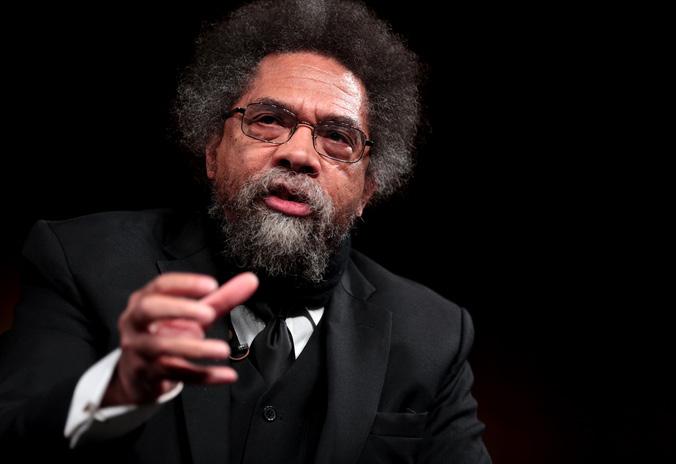
5C Ski & Snowboard Club suspended
BEN LAUREN & ANSLEY WASHBURN
On Tuesday, March 28, leadership of the 5C Ski & Snowboard Club sent an email asking hundreds of students and alumni on their email list for their support regarding a recent suspension that the Pomona College administration sanctioned.
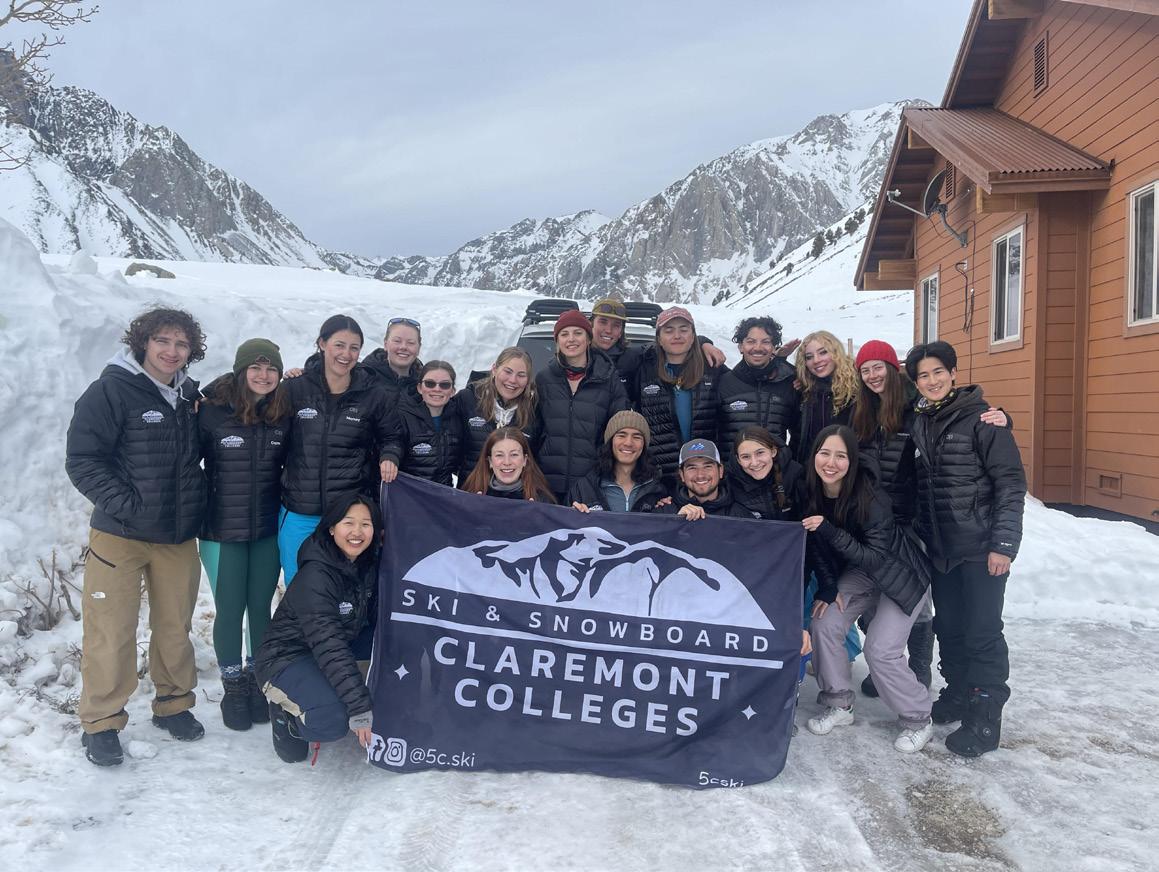
In the email, the club explained that the Pomona administration placed them on suspension until the spring of 2024 and froze their funding until then. The email attributed their suspension to an unauthorized bus and accusations –– which they denied –– of the use of funding for the purchase of alcohol. The email criticized the administration for writing new policy “overnight” in order to “punish the Ski Club for having and operating the bus.”
In the summer of 2022, former president of the club and current chief advisor of both the club and team, Kirill Myagkov PO ’23, purchased a used school bus in hopes
MAYA ZHAN
In anticipation of Cornel West’s talk, the packed Athenaeum teemed with excitement and joy. On March 23, the 30th anniversary of his seminal book “Race Matters,” Cornel West spoke with Claremont McKenna College philosophy professor Briana Toole.
West is a prominent left-wing social activist, academic, philosopher and public intellectual. He has served as honorary chairman for the Democratic Socialists of America, published over 10 books and held professorships at Harvard, Yale and Princeton, among others. West’s talk chronicled his re-
flections on race and how its role in our society have shifted in the 30 years since he published “Race Matters,” as well as how we ought to grapple with the widespread depression and nihilism resulting from the turbulent political climate of today.
Toole stressed the importance of West’s talk in our present moment.
“[West] is really good at reaching across the aisle and trying to talk in a language that both republicans and liberals will be acceptable towards,” Toole said. “That’s important because we can’t exist in echo chambers…that’s how you end
in the 30
up in a society that’s stalled. That’s how we got where we are now.”
Rukmini Banerjee CM ’24, a Marian Miner Cook Woolley Fellow and planner of the event, discussed the significance of “Race Matters” in her academic and social justice journey.
“Cornel West is a towering figure in the academic community and in activist circles because of the way in which he realizes the idea of critical consciousness and learning for the purposes of liberation,” she said. “The things that we
See WEST on page 4
of using it to transport students and gear on excursions. He said that the club saw this purchase as a solution to an issue they had faced in the past with transportation.
“With our … our accessibility initiatives, where we’re specifically taking 30, 40, 50, 60 people up, who maybe have never even seen snow,” Myagkov told TSL. “We’re relying on volunteers to be able to drive them in their personal vehicles, we figured that we needed a solution to be able to transport more folks … we weren’t able never able to convince [the athletics departments] to allow us to use their passenger vans … The school doesn’t actually really have any great resources when it comes to transportation for students.”
The bus was purchased without any institutional funding in hopes of avoiding liability issues with the school. Myagkov, along with David Enders CM ’24 created an LLC which he claims they funded with money given to the organization from Ikon Pass and outside crowdfunding efforts.
See SKI on page 11
cOURTESY: KIRILL MYAGKOV
Following eight-year legal battle, Claremont School of Theology will move to LA this summer

 SIENA SWIFT
SIENA SWIFT
An end may be in sight for the nearly decade-long legal debate regarding the validity of a 1957 land agreement between the Claremont School of Theology (CST) and The Claremont Colleges Services (TCCS).
After 66 years in Claremont, CST plans to move to a new site at Westwood United Methodist Church in Los Angeles this summer, according to a March 15 press release issued by the school. CST is currently in a final review and affirmation process with the Western Association of Schools and Colleges of the Westwood location.
CST was founded in 1885 and was attached to the University of Southern California until it moved to Claremont in 1957.
“Los Angeles is really a part of the DNA of the school,” Steve Horswill-Johnston, CST’s COO, told TSL. “The school attracts a lot of people who are committed to those who are on the margins, who live in and around large cities, and do nonprofit work in and around cities like Los Angeles. So to be in Los Angeles is actually very exciting for most of
scribed formula.
In 2015, CST first approached the Claremont Colleges to sell 10.5 acres of its 16.4-acre property to address financial struggles as it moved towards offering more online courses.
CST was already $40,000 in debt when it first moved to Claremont, Horswill-Johnston said.
“The school’s always been struggling with finances and I think that’s kind of baked into the kind of mission we have. It’s not a money-making school, it’s a school that’s committed to types of ministries and leadership around the world that often doesn’t lead to financial success,” he said. “It leads to students going out, graduates going out, scholars going out, and making a difference in the world.”
+24 cases
CST plans to relocate to Westwood this summer after residing in Claremont since 1957.
AUSTIN ZANG • ThE STUDENT LIFE them.”
Horswill-Johnston added that the school is working to identify and subsidize affordable housing options for its students currently living on cam -
TSL COVID-19 Tracker covid.tsl.news from Mar. 20 - 26
told TSL Oct. 10 that the school will no longer post case counts on a dashboard and instead will alert students via email when there is a surge in cases.

pus in addition to covering all moving costs. When CST — which is affiliated with, but not a member of, the consortium — first purchased the land from the Clare -
mont Colleges in 1957, the deed stipulated that if the graduate school ever decided to sell the land, TCCS would have the right of first offer either at fair market value or by using a pre -
CST had the land appraised for nearly $40 million in 2016, but TCCS offered $14 million for the property, which CST said was insufficient.
Then, CST attempted to sell the ten-acre package to a commercial developer for $25 million in order to move to Salem, Ore -
Data from each of the 5Cs school’s testing dashboards at press time. Visit covid.tsl.news for historical data.
Was it love at first spike?
The 5C women’s club volleyball team, also known as the Panthers, allows students in Claremont the opportunity to compete at a high level in a sport they love, without the overbearing time commitment of the varsity level, and while still fostering an inclusive and fun environment.

The student newspaper of the Claremont Colleges since 1889 INDEX: News 1 | Arts & Culture 4 | Opinions 7 | Sports 8 FRIDAY, MARch 31, 2023 CLAREMONT, CA VOL. CXXXIV NO. 18 ARTS & CULTURE OPINIONS SPORTS This past weekend Spotlight MT, the 5C student-run musical theater club, connected past and present with its production of “Spring Awakening.” A coming of age musical about young teenagers newly exploring their bodies without adult guidance With a physician shortage right around the corner, the future is looking bleak for pre-medical students – or so predicts guest writer Joanne Oh PZ ‘25. GUS ALBAch • ThE STUDENT LIFE
PO HMC CMC PZ SC 0 25 20 15 10 5 Student
Staff Undifferentiated
+0
** HMC
at the 5Cs +8 +5 ** ** No data reported +9 +2 See CST on page 2
cOURTESY: GAGE SKIDMORE/FLIcKR
West’s talk chronicled his reflections on race and how its role in our society have shifted
years since he published “Race Matters.”
Ski
Snowboard Club has been indefinitely suspended by Pomona
ministration, due to alleged misuse of school funds.
5C
&
Ad-
Pomona tuition reaches historic high
CST: School of theology prepares for ‘exciting’ move
Continued from page 1 gon and partner with Willamette University.
In response, the 7Cs sued CST, igniting a legal battle over the interpretation of the 1957 agreement and its formula. The case first went to trial in 2018, with CST being handed a short-lived victory that was overturned in the Appellate Court in 2019. The California Supreme Court declined to hear CST’s case.
ongoing according to the court docket.
According to Horwill-Johnston, CST and Yalong continue to have a good relationship. Yalong’s complaint is in abeyance until arbitration between TCCS and CST concludes.
Following a nine-year trend, Pomona College will increase tuition for the 2023-2024 academic year.
According to an email sent by President Gabrielle Starr on March 13, tuition will be raised to $61,906, and room and board will be raised to $20,374. ASPC student fees will remain at $420. These increases will total to a comprehensive fee of $82,700, reflecting a 5.2 percent increase in price over the past year.
Jeff Roth, COO and treasurer at Pomona, stated that this raise in tuition largely stems from rising economic cost pressures and inflation. He further explained that the college will likely see continued increases in tuition in the following years.
“While we are careful stewards of our available resources, we can’t completely insulate our budget from the rising cost pressures in our economy,” Roth said in an email to TSL. “Therefore, as we look ahead, we do anticipate a need for continued modest annual increases over the [next] few years.”

Both Starr and Roth emphasized Pomona’s commitment to supporting students with this financial investment, claiming that the school will increase financial aid along with tuition in order to meet each student’s full demon-
strated need. Despite this promised increase in financial support, ASPC President Vera Berger PO ’23 expressed concern about the effect of this tuition change on prospective students.
“People see the sticker price on a place like Pomona and can be deterred from applying because they don’t know how financial aid works or maybe because they’re not eligible for full financial aid,” Berger said.
ASPC Vice President of Finance Ariana Makar PO ’24 similarly noted that tuition increases potentially hinder prospective students from attending. She also acknowledged the frustration that students might feel regarding this financial change.
“Tuition goes up, but some of the services or traditions on campus don’t move with it, which can be frustrating,” Makar said.
Makar also stated that while Pomona does have resources that help students with financial changes and information, these resources are relatively unadvertised and inaccessible, especially to newer students. She cited emergency grant funding as an example.
“I know that we have emergency grant funding through Merryann Bishop [administrative services coordinator and dean of students at Pomona], and I just learned about that
this year as a junior,” Makar said. “There are resources, but they’re not well advertised, and I think accessibility is not done the best that it could be.” Berger added that beyond transparency, she would also like to see Pomona provide more financial resources, so that ASPC doesn’t have to take that on.
“It seems like we’re running into barriers with the college in trying to get them to support students, so ASPC is looking for alternatives,” she said. These alternatives include attempts to increase the $50 credit allotted to students for use at the Huntley Bookstore, as well as research into open-access textbooks. As ASPC works towards these alternative methods of financial support, Makar hopes that the college will also improve its communication about finances, recognizing that much of the frustration about tuition increases stems from a lack of understanding between the college and the students and families paying for it.
“There’s a lot that I’m sure students and families don’t know about what it takes to run a college and manage the budget of a college, and inflation is really high,” Makar said. “The college could definitely be more transparent about how it’s dealing with things.”
“Even if we didn’t have the litigation, [the Claremont property] would be a millstone around the neck of the school because you just don’t need 16.3 acres when a lot of the student body is remote and coming into Claremont, or living on our campus, but only doing in person classes on occasion,” Horswill-Johnston said.
However, CST signed an agreement with Yalong Investment Group, giving it exclusive use of the property for $10 million. In response, TCCS filed suit in the California Court of Appeals.
The battle in the Court of Appeals continued through 2021 until the Superior Court ruled in January 2022 that CST was prohibited from leasing, transferring or selling the property to third parties, including Yalong.
Yalong had planned to use the land to establish a bilingual Chinese-English college, according to CST. However, TCCS alleged in court documents that Yalong was not “a bona fide educational institution of collegiate grade,” so CST’s agreement with the group would also violate the property’s Educational Use Clause.
In April 2022, TCCS said that Yalong filed a cross-complaint against CST in order to recoup the $10 million it had paid for the property prior to the ruling. The case is still
“We remain steadfast in our commitment to protect the legacy of the Scripps family and ensuring that the land donated to TCC and provided to CST in 1957 is used in a manner consistent with the higher education mission of The Claremont Colleges,” TCCS Director of Communications Laura Muna-Landa said in a Jan. 4, 2022 statement.
Muna-Landa declined to provide an updated comment.
After three separate cases and three appeals, CST and TCCS will announce a final sale price by the end of this calendar year.
“We’re hopeful to at least get close to market value so we can pay off the debts we have and move to Westwood this summer,” Horswill-Johnston said. “[With] the amount of what land costs in the Claremont area and that there is no piece of land in Claremont that is available that is as large as our campus — the value is high.”
He added that arbitration has yet to begin in earnest but that CST hopes to conclude the process by the end of summer or early fall.
TCCS has said it plans to use the land for additional student housing, office and classroom spaces as well as new 5C initiatives and programs.
CST will host a farewell event at its Claremont campus on May 15, 2023 with alumni and faculty speakers, including Bishop Cedrick D. Bridgeforth CST ’00, the first openly gay Black man to be elected in the United Methodist Church.
“It’s really not about the move,” Horswill-Johnston said. “It’s really trying to keep up the oldest theological school in the Pacific Southwest. We’re trying to keep that mission going.”
Myrlie Evers-Williams PO ’68 celebrates 90th birthday at Pomona
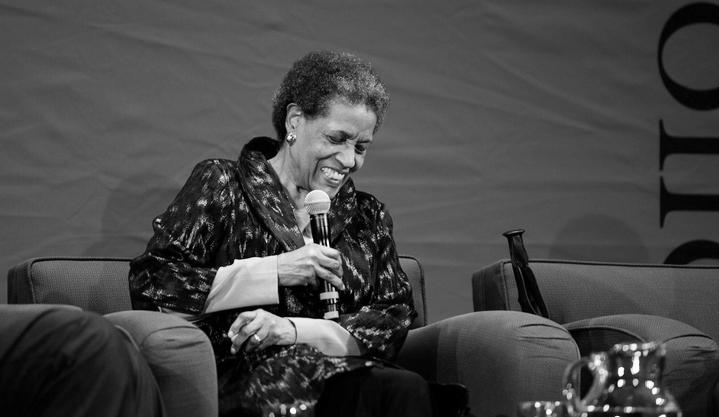
On March 22, Pomona College held a 90th birthday tribute to celebrate civil rights activist Myrlie Evers-Williams PO ’68. Family, friends, alumni and staff were invited, along with Evers-Williams, to view the archival collection that she recently donated to the college and to hear from a variety of important figures in Evers-Williams’ life.
The birthday reception was an opportunity for invited guests and Claremont Colleges students to talk about and view various parts of the archival collection, which includes thousands of artifacts that showcase Evers-Williams’ and the nation’s long road toward justice.
At the event, the collection was displayed chronologically, with several stations showcasing the highlights of Evers-Williams’ life: working for the civil rights movement, serving as NAACP chairwoman, performing at Carnegie Hall, speaking for TEDx and lecturing at various renowned organizations.
Evers-Williams’ birthday celebration hosted visitors from across the country. Among the many guests was California State University San Bernardino president Tomas Morales, who worked at Medgar Evers College, named after Evers-Williams’ late husband.
“We’re honoring a very distinguished member of our society, of our country,” Morales said. “It’s a wonderful way for the community to celebrate this great woman.”
Peter Sasaki PO ’91, who serves on the board of trustees at Pomona, flew from New York to see the tribute.
“There is no way I was going to miss something like this, that is really special for the country, but also really special for Pomona,” Sasaki said.
Many of the attendees said they were impressed with the history of Evers-Williams’ life provided by the archives.
“What stood out to me is this multi-talented woman leader, an author, an artist, [a performer], a civil rights activist, assuming the chair of the NAACP, and a family that came back from a tragic murder of their father, her husband,”
Morales said. “I was incredibly impressed with the archives that have been bestowed to Pomona College.”
English professor Prageeta Sharma took particular interest in one part of the collection: the red dress Evers-Williams wore during a performance at Carnegie Hall on Dec. 6, 2012. Before Evers-Williams became a prominent civil rights activist, she studied classical piano at Alcorn State University in Mississippi.
In her closing remark of the video tribute, Evers-Williams recalled her experience performing.
“It was the dream of my grandmother and then it became my dream,” she said. “I have been blessed.”
At 6 p.m., guests were ushered into Bridges Auditorium, where a short biographical video about Evers-Williams’ life was played. Evers-Williams shared the importance of her experiences and how they made her into who she
is today. “The pain and the scars that come from being my color and living in a segregated society is painful, it’s something you don’t forget,” Evers-Williams said in the video. “It’s something that you gain strength from, not only to survive, but it’s something that is instilled in you where you want to help people regardless of the color of their skin, to understand each other, to realize we are all human beings.”
President Gabi Starr’s opening remarks commended Evers-Williams’ resilience and wisdom.
“This is a woman who accepts challenges and lives a life of purpose,” Starr said. “Not hanging onto her identity as a widow, she became a leader in her own right. As she once put it, she became ‘just Myrlie.’” Starr added that she hopes Evers-Williams can feel the love of her community. “It’s the love she found with
Medgar, it’s the love she found again with Walter Marese, who she married on Pomona’s campus in 1996, it’s the love she shares with her family and the community, it’s the love that sustained her as grief gave way to healing and hope,” Starr said. “Thank you for the gifts you have given us all, not just the extraordinary collection that you have gifted this college, but the gifts of watching your grace and your courage, your beauty, and your love.”
The tributes followed a musical performance from Pomona music professors Melissa Green and Genevieve Lee and a collection of speeches about Evers-Williams’ impact. One impactful tribute came from Barack Obama and Michelle Obama, the 44th President and former first lady, respectively. Evers-Williams performed former President Obama’s invocation at his second presidential inauguration. She became the first woman
and the first non-clergy member to perform the prayer.
“Over the course of 90 years, you have changed our country for the better,” President Obama said to Evers-Williams in the video. “Often in the face of enormous obstacles, your tireless work fighting for civil rights is an inspiration to us all. And we know that the rich history of your archrival records will aid future generations in their pursuit for a more equitable, just America.”
Pomona Black Student Union co-president Precious Omomofe PO ’24 presented Evers-Williams with flowers as she gave her closing remarks.
“I found Pomona College to be more [of] a home than perhaps home even was,” Evers-Williams said. “Pomona College filled so many empty spaces in me [and] in the lives of my children. They gave me a smile and told me ‘you can do it!’ I will never forget Pomona College.”
PAGE 2 MARch 31, 2023 News
COURTESY: POMONA COLLEGE Civil rights activist and Pomona alum Myrlie Evers-Wiliams turned 90 on March 17.
LUcIA MARQUEZ • ThE STUDENT LIFE
FIONA HERBOLD & ANNABELLE INK
JULIA PARSA
5Cs admit class of 2027
This March, the 5Cs sent offers of admission to thousands of students for the class of 2027.
Harvey Mudd College was the first 5C to release its regular admission decisions on March 1, followed by Pomona and Scripps College, who announced their decisions on March 17.
Pomona reported that of the 757 applicants admitted, the students comprise 48 states, the District of Columbia, American Samoa, and 50 other countries. Pomona’s newly admitted class is also the most diverse in the college’s history, with 62.5 percent domestic students of color, 14.3 percent international students, and 23.1 percent first-generation college students.

Pitzer College released its decisions on March 20, admitting 567 students from 38 states, including the District of Columbia and 25 other countries. Pitzer’s acceptance rate was 15.9 percent this year, a drop from the 17.5 percent acceptance rate of the previous year.
Pitzer’s admitted class of 2027 is 47.6 percent students of color, 8.6 percent international students and 14.8 percent first generation college students. In comparison, the class of 2026 had more students of color and international students, with 49.5 percent and 9.3 percent respectively. However, the class of 2026 had less first generation students — 12.3 percent.
Pitzer is operating under a testfree pilot policy until 2025, which means that the admissions office does not consider standardized test scores. The college has been
TsL wins over 20 awards at California college journalism conference

TSL won 20 awards at the California College Media Association’s (CCMA) annual award ceremony on March 11 in San Francisco, marking TSL as a top college newspaper in the state. With 10 first place wins and over 15 staff members represented, TSL took home some of the largest awards for its category — colleges under 15,000 students — including Best Newspaper, Best Website, and Best Design.
Over 750 college journalists from across the state attended the conference, which is sponsored by CCMA, Associated Collegiate Press (ACP), and the Journalism Association of Community Colleges.
TSL also earned two awards from ACP at its Best of Show awards presentation on March 11. TSL took third place in its category for Best Newspaper, pitted against college papers around the country. Similarly, TSL nabbed fourth place for Best Website in ACP’s staff recognition award ceremony.
Here’s the full list of CCMA winners from TSL:
First Place
Best Newspaper: Jenna McMurtry, Mena Bova, Larkin Barnard-Bahn, Jasper Davidoff, Caelan Reeves, Anushe Engineer
Best Newspaper Website: Elizabeth Johnson, Samson Zhang, James Karsten, Jasper Davidoff, Jenna McMurtry
Best Overall Newspaper Design: James Karsten, Grace Sauers, Jasper Davidoff, Anushe Engineer, Caelan Reeves
Best Interactive Graphic: Samson Zhang, Rya Jetha, Mariana Duran, Reia Li, Jenna McMurtry
Best Editorial: Jasper Davidoff, Caelan Reeves
Best Social Media Reporting: Samson Zhang, Jasper Davidoff, Bella Pettengill, Jenna McMurtry, Bithiah Negusu, Clare A’Hearn
Best Feature Story: Ava Francis-Hall,
United Farm Workers’ Teresa Romero speaks on unionizing at McConnell
Katherine Tan, Samson Zhang
Best News Photograph: Mariana Duran
Best Social Justice Coverage : Siena Swift, Jenna McMurtry, Sara Cawley, Hannah Weaver, John Paul Ferrantino, Elina Lingappa
Best News Series: Siena Swift, Mariana Duran, Jenna McMurtry, Sara Cawley, Serena Li
Second Place
Best Newspaper Inside Page/ Spread Design: Kayla Alcorcha, Lucia Marquez Uppman, Jenna McMurtry, Grace Sauers
Best Special Issue/Section: Jenna McMurtry, Averi Sullivan, Reia Li, Katherine Tan, John Paul Ferrantino, Elina Lingappa, Maxine Davey, Valerie Braylovskiy, Mariana Duran, Rya Jetha, Wally Bargeron, Abby Porter, Julia Schwartz, Samson Zhang, Siena Swift, James Karsten, Grace Sauers, Jasper Davidoff
Best Arts & Entertainment Story: Mirabella Miller
Best Infographic: Unity Tambellin-Smith, Asaka Mori
Best Breaking News Story: Jasper Davidoff
Best Photo Illustration: Clare Martin
Best Newspaper Column: Cassidy Bensko
Best Headline Portfolio: Jasper Davidoff
Third Place
Best Newspaper Front Page Design: Marcella Cannatti, Caelan Reeves, Anushe Engineer, Grace Sauers, James Karsten, Jasper Davidoff
Best Sports Photograph: Abbey Liao
Congratulations to the award winners!
On Tuesday, March 28, the Claremont Colleges United Framer Workers (SFFW) hosted a dinner conversation with United Farm Workers (UFW) President Teresa Romero, the first Latina immigrant woman to lead a national labor union, at Pitzer College’s McConnell Founder’s room.

Founded in 1962, the UFW is the first and largest farm workers union in the United States, centering activism in and around the state of California. Under Romero, the union has implemented state standards to protect farm workers from extreme heat and successfully lobbied for the first state law in the country securing overtime pay after eight hours of work.
Romero’s presentation highlighted the regulations and labor laws that have saved farm workers’ lives, including the Half Moon Bay shooting, where a gunman killed seven agricultural workers and wounded several others at two agricultural sites on Jan. 23 in Northern California. She urged attendees to demand government officials combat such farmworker injustices with policy.
“The laws in the books are not the same as the laws on the fields,” she said. “We need to make sure that our farmworkers are properly protected as they are the ones who provided us the sustenance we need to live every day.”
Kenny Lê PZ ’25, operations lead of SFFW, felt grateful to organize this talk with Romero, especially during the week of César Chávez Day.
“Organizing this event was very complicated but extremely fulfilling,” he said. “Because our club is relatively new, we had to pull from other collegiate departments and affinity centers that have worked traditionally hosted events during César Chávez week to make this event a success.”
Lê appreciated that Romero highlighted injustices in current labor law legislation and provided anecdotes of the conditions faced by agricultural workers in the United States.
“I thought it was important that Romero talked about how labor laws were never made to fully support people like farmworkers,” he said. “There have always been gaps [and] inconsistencies with the implementation of the laws, with how it functions, with its mechanisms that are grounded in a history that has to do with neoliberalism, racial capitalism, and border violence.”
Organizer Leilani Filimaua PO ’23 found Romero’s presentation to be relevant to many members of the Claremont community, including herself.
“People don’t realize just how much pain people in the labor industry are facing beneath the surface. My grandfather was a Bracero, he came over from Mexico when he was 17 and was spraying DDT everyday,” she said. “These are stories that really affect us and
our California population, [and] that’s why I think it’s especially important that Claremont students should be at least conscious of these issues happening around them.”
Filimaua added that more Claremont students should use their platform to speak about unjust labor laws and discrimination against farmers.
“We go to the dining halls every day, and some people don’t even think about where their food is coming from,” she said. “I think it’s important to put names and faces to those people and recognize that we have privilege and that we have a platform to make a difference in these issues.”
Lê and Filimaua acknowledged that there is a lot of work that still has to be done to achieve justice for farm workers.
“Like Romero said, only two congresspeople –– Alex Padilla and Cory Booker –– showed up to UFW marches of 100 that they asked, so I think that shows that even though UFW is very well respected in terms of government support, we’re still not there in achieving all our goals,” Filimaua said.
But Lê is optimistic that continuing to educate the public about the adversity present in the farming industry will eventually help those that suffer from it.
“Because of the political climate and divisive nature [of this issue], farmers are constantly facing oppression and discrimination,” he said. “We have a long work road ahead and I think Teresa did an amazing job of highlighting the different stories and the struggles.”
MARch 31, 2023 PAGE 3 News
ELLA LEhAVI • ThE STUDENT LIFE
SAJAH ALI
MAXINE DAVEY & SIENA SWIFT
Special Projects editor Jenna McMurty and Creative Director Grace Sauers collected awards along with other TSL staff members in San Francisco on March 11. SIENA SWIFT • ThE STUDENT LIFE WENDY
NHI NGUYEN
ZhANG • ThE STUDENT LIFE
Teresa Romero spoke at Pitzer College on March 28.
test-optional since 2003.
In Issue 17, an Arts & Culture article about an exhibit at the Benton was attributed to Jo Keyser, when in actuality it was written by Julia Skaggs. TSL regrets this error. TSL regrets the errors. Corrections
A week after Pitzer, Claremont McKenna College sent its decisions to students on March 24. Harvey Mudd, Scripps, and Claremont McKenna have not
yet reported any data on the makeup of their admitted classes.
‘Desires, Dreams, and Destinations’ at the Benton spotlights APIDA artists
JADA SHAVERS
When entering any museum, a hush typically fills the space as famous pieces of art occupy the expected silence. On Friday, March 24, on the bottom floor of the Benton Museum of Art at Pomona College, this expected hush was replaced with a chatter of wonder from students, professors and art enthusiasts as the “Desires, Dreams, and Destinations” of Asian Pacific Islander Desi American (APIDA) artists became the topic of discussion.
“This is a special curation of art by APIDA artists, [which is] something you rarely get to see in a lot of museums around the world,” Audrey Yung SC ’25, an attendee of the collection, said. “It’s nice to have this special little collection of the cool stuff that APIDA artists are doing.”
To allow for this representation to be on display, the Asian American Advisory Board collaborated with the Benton Museum to create a Salon Series that would give space to APIDA artists.
“The mission of the Asian American Advisory Board is to foster collaboration between and provide support for 7C APIDA affinity groups. I collaborated with the Benton on this Salon Series in order to showcase APIDA artists, who, alongside other minoritized and racialized artists, are often underrepresented and neglected in the art world,” Sydney Nemetz Sc`25, a AdBoard student coordinator, said. “Through this Salon Series, I hope to showcase the diversity of expression and creativity of APIDA artists and to create higher visibility for them within the art world and on campus.”
With around 20twenty pieces on display, a center table and surrounding wall ledges were intentionally used to create this
visibility and show the past, present and future of APIDA art. An array of pieces were on display with large paintings, small wood carvings, photographs and even a small basket pulled from collections.
Corina Silverstein SC ’25 is one of the Benton After Hours interns involved with organizing and curating the event.
“People have conversations [and] experiences coming into the space. I think that’s something really beautiful to take away,” Silverstein said.
The small room was quickly filled with one of the largest turnouts for the Benton Salon series, according to Silverstein, with roughly 30thirty people wandering the space. The interest from students stemmed from a few reasons, and word about
the event spread fast.
“[It was] really interesting to me as someone who is going into that field,” Sophie Beuman SC ’25, an attendee of the event, said. For other students, the collection provided a chance to apply some of the knowledge from classes on campus.
“I’m taking drawing at Pomona, and … I thought it was kind of cool seeing that outside of the classroom, [and] being able to relate to that,” attendee Meelod Wahed PO ’25 said.
As a place for students to explore, the Benton Salon Series is meant to be formed through conversation and collaboration. This effect is present with students discussing these class applications and freely expressing their thoughts throughout the curation.
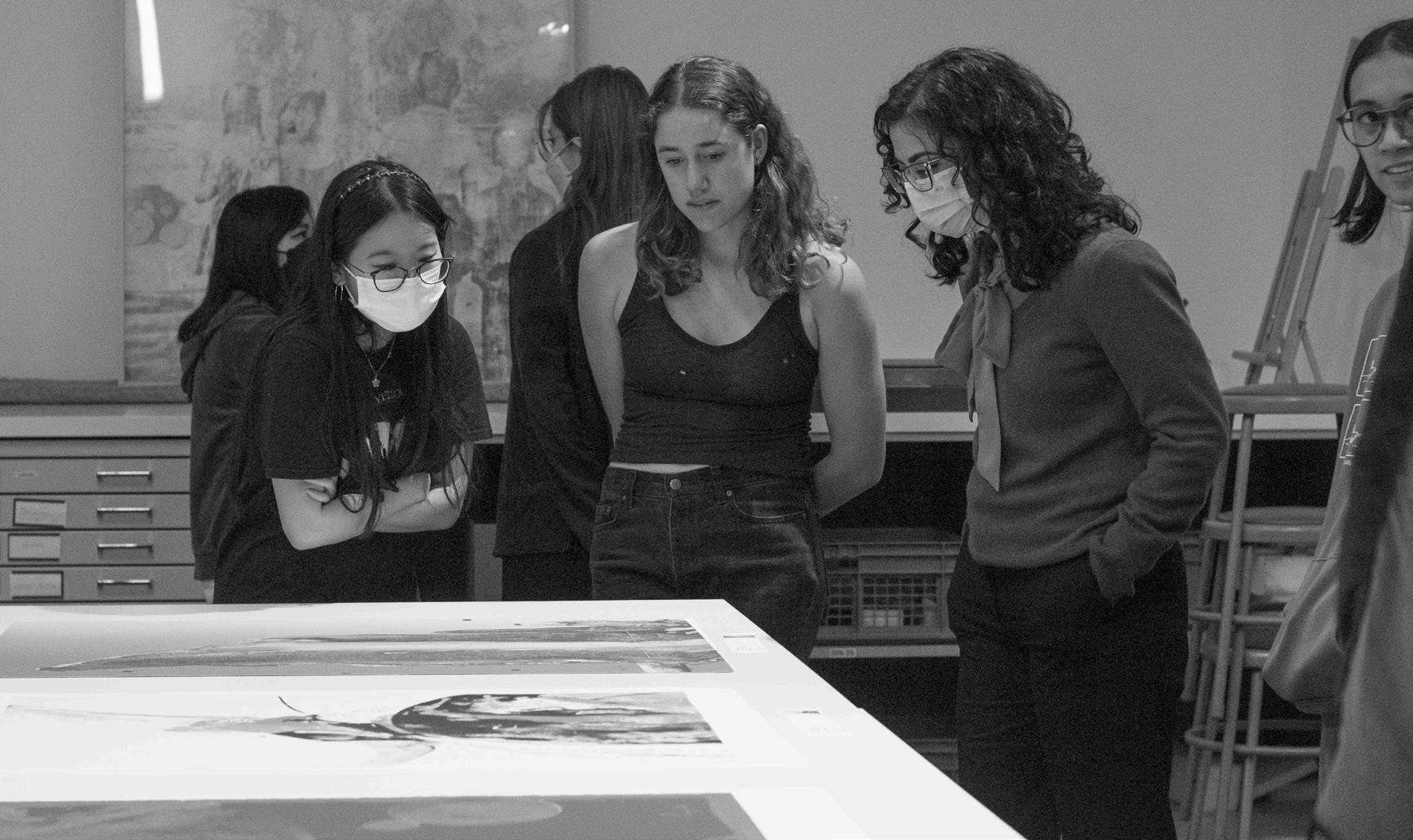
“The interactive component of asking questions, kind of getting our thoughts, felt very nice,” Aanother student attendee, Josh Yum PO ’25, said. Many others agreed that the discussions raised were helpful for those looking at the pieces. As a chance to say what they were thinking, the conversations allowed students to process the piece and listen to the thoughts of others.
“I thought that was actually really nice because I just got to say what I thought,” Wahed said. This interactive flow changes common perceptions of the ways people can interact with art. Art is known for being subjective, and the “Salon Series” provides a chance to share the ways art can be interpreted. Creating an intimate experi -
ence for anyone in the space, this conversational aspect allows for those in attendance to reflect with the community. As the experiences and skills of APIDA artists are on display, the series aimed to encourage its viewers to think intentionally throughout the curation.
“We started thinking … in conversation about dreams [and] destinations,” Silverstein said. “What are things that I envisioned and not envisioned in the works?”
Prompted with questions similar to this during the series, many were able to search for answers through art. This aspect hints at the overarching theme of the collection: a discussion about what has been missing from art narratives.
“I feel like this is a very intentional curation, honestly, and … I think for someone like me as an APIDA student, I think it’s super cool because you don’t see it very often,” Yung said. “So to have this space and such an intimate conversation is super cool.”
Bringing people together through conversation and curiosity, the “Salon Sseries” was a success to many in attendance. The series ended with a casual wine and cheese debrief period, which allowed those in attendance to draw artwork of their own.
Conversations about art and other aspects of life continued to flow, which created a unique community. Opening its doors to anyone interested, “Desires, Dreams, and Destinations” provided new insight into the wonders of the Benton Museum.
“[Thise collection] is really a reminder that anyone has access to the collections,” Silverstein said. “I think the whole thing about the curator, or interns, or whatever being the masters or the experts, is not at all true. It’s all about collaboration.”
At Harvey Mudd College’s Makerspace, a place where students can learn everything from how to sew a tote bag to how to use a printing press, students aren’t just provided with technology. They have access to a space that fosters innovation, learning and a sense of community.
The Makerspace, which is located in the Scott A. McGregor Computer Science Center, provides students at all of the Claremont Colleges with tools to create, workshops to learn new skills and stewards who help out around the center.

Some of the tools include laser cutters, 3D printers, reverse air systems that allow students to create without inhaling fumes and audio and visual equipment.
Makerspace manager Kim Neal wants people to feel comfortable making and innovating in the space.
“The Makerspace is a student-run, welcoming and inclusive environment for all students, faculty and staff from the 7Cs, where you can make things,” Neal said. “Goals of the Makerspace include fostering a creative and welcoming community and making sure everyone who visits feels welcome to learn how to use the equipment, tools and materials we offer in a safe manner.”
As manager of the Makerspace, Neal’s role is to support Makerspace stewards who will assist users with Makerspace equipment. However, because the space is student-run, the stewards are typically in charge of day-to-day operations at the Makerspace.
As a head steward, Emma Sar SC ’23 is one of the managers of the Makerspace. Her job specifically entails managing the coordination, advertisement and planning workshops, which are designed to teach students various skills using Makerspace machinery. “We have lots of different materials and machinery to help you in the process of making and one of our big goals is really learning,” Sar said. “We want people to feel safe, to try new things and to make mistakes, but in a safe environment.”
Sar’s objective isn’t simply to help foster learning among 7C students, though. They also want the space to serve as a place of community for students with a desire to create and innovate.
“We want it to be a place where people can come and feel comfortable learning something new, meeting people, going up to someone who looks like they’re doing something interesting and asking what they’re doing,” Sar said. “I think that it’s a great place for meeting other students with like-minded interests, learning new things and widening your comfort zone.”
As an employee at the Makerspace, Sar has found her own Makerspace community, bonding with employees and users of the space.
“I wouldn’t say I’m a shy person, but I definitely am not very good about going out and meeting lots of new people, but this past year that I’ve been working
on Makerspace, I really feel like I’ve met a lot more people and created much more of a community,” Sar said. “I’ve made a lot more friends than I ever had in college before, and so it’s definitely nice being able to walk around campus and being like, ‘Hey, I know you from the Makerspace.’”
While the space is mostly used by Mudd and Scripps College students, Sar hopes that eventually, the space will serve as a way to connect people from across the Claremont Colleges despite its distance from the other schools.
“It’s kind of out of the way, but it’s worth it once you get inside,” Sar said. “A lot of my friends go to Mudd, and I do think that there’s a pretty distinct line between the other 4Cs and Mudd, and having the Makerspace on Mudd’s campus is definitely a way of bridging that divide and integrating Mudd into the rest of the 5Cs.”
Ultimately, Neal believes that all different types of students can enjoy the space.
“Students should use the Makerspace to figure out how to put something together that they’re learning about in class,” Neal said. “Students should use the Makerspace to relax after a hard day studying or to make a gift for a family member. Most importantly, students should use the Makerspace to meet other people who are also making things, learn from one another and make some friends.”
WEST: ‘Prisoner of hope’
continued from page 1
study have meaning. They’re not just words or concepts that we think of and they’re not meant to exist in a vacuum.”
West began by referencing social issues such as rampant commodification, neo-fascism and imperialism which have only exacerbated since 1993, the year his book was published.
“When commodification takes over, when everything is for sale, when everyone is for sale, the commandment is to avoid getting caught,” West said.
The focus then shifted to the resultant depression and loss of hope, especially among youth today, which was particularly resonant. West cited pragmatist philosopher John Dewey. Dewey writes, “the willingness to take things in detail rather [than] in sweeping generalities, retail rather than wholesale.”
West co-opted Dewey’s retail/wholesale dichotomy to elucidate his own views on the subject.
“A culture that doesn’t equip you to be vulnerable enough to know genuine love leads to wholesale depression,” West said. “Wholesale pessimism is harmful, but retail pessimism can be beautiful.”
This statement particularly struck Sofia Centeno PO ’26, who reflected on the importance of community.
“Allowing ourselves that space for vulnerability and recognition of humanity are everyday acts we can do to build hope,” she said. “This talk reminded me to be more intentional with those around me.”
Toole brought up the quote from West’s book, which nicely distills the idea of cultivation of love at the heart of his talk:
“Nihilism is not overcome by arguments or analyses; it is tamed by love and care,” he writes. “Any disease of the soul must be conquered by a turning of one’s soul. This turning is done through one’s own affirmation of one’s worth –– an affirmation fueled by the concern of others. A love ethic must be at the center of a politics of conversion.”
West shared a few anecdotes which aligned with the “love ethic.”An example he gave was that a simple “how’s your mom doing?” question can transcend the political line.
Memorably, West called himself a “prisoner of hope.” When asked about the distinction between hope and optimism, he stated that optimism is effectively assuming the role of a spectator, while hope entails being a participant. As he emphasized the revealing nature of hope, his words seemed to spill out in a captivating rhythm.
“[You’re a participant] in the mire … in the funk … in the impure,” West said. “Once you’re in it you see the incongruities not just in others, but in yourself.”
The audience was entranced by West’s resolute cadence.
“The type of excitement and adrenaline that he has the ability to incite [is inspiring] … when Dr. West talks, it’s like a sermon. It literally feels like you’re going to church and being preached to,” Banerjee said.
Interwoven with his assertions were quotes from his favorite books, ideas from the Black church, stories of his loved ones and appreciation for Black icons. By and large, the audience connected with him on an incredibly deep level due to the sense of community he fostered through his quips and personal tidbits.
In a broad sense, his love for us humans, from our art to our very beings, undergirded his every word. His talk resonated with each audience member differently, manifesting in a remarkable camaraderie that arose from the embrace of difference.
Cornel West, prolific left-wing activist, author and public intellectual, delivered a talk to an excited Athenaeum audience on March 23. CMC philosophy professor Briana Toole facilitated the talk. West’s talk addressed ways to remedy our callous, nihilistic attitude that has taken shape in the years since his influential book “Race Matters” was published in 1993. He addressed topical concerns such as depression amongst college students, as well as a plethora of universal themes such as the paramount value of art and the importance of community.
“[You’re a participant] in the mire…in the funk…in the impure,” West said. “Once you’re in it you see the incongruities not just in others, but in yourself.”
“[West] is really good at reaching across the aisle and trying to talk in a language that both republicans and liberals will be acceptable towards,” Briana Toole said. “That’s important because we can’t exist in echo chambers… that’s how you end up in a society that’s stalled. That’s how we got where we are now.”
PAGE 4 MArch 31, 2023 Arts & Culture
The Asian American Advisory Board collaborated with the Benton Museum to create a Salon Series that would give space to APIDA artists.
EMMA NEWMAN
Mudd’s Makerspace offers students place for creativity, community
EMMA JENSEN • ThE STUDENT LIFE
Students can use
Makerspace to learn new skills, create projects and find a community. chASE WADE • ThE STUDENT LIFE
Harvey Mudd’s
M t spotlight’s ‘spring Awakening’ explores enduring sexual repression
 JO KEYSER
JO KEYSER
This past weekend, Spotlight MT, the 5C student-run musical theater club, connected past and present with its production of “Spring Awakening,” a coming of age musical about young teenagers newly exploring their bodies without adult guidance. The musical, which premiered on Broadway in 2006, is adapted from a groundbreaking and controversial play by German writer Frank Wedekind in the 1890s, and covers lightning-rod topics such as abortion, sexual violence and suicide.
For Rosie Corr PO ’23, director of the Spotlight production, the play’s subject matter is still shockingly relevant.
“Wedekind was in 1890s Germany, writing about abortion and its dangers,” Corr said. “Here we are in a postRoe world in 2023, using this show as a period piece to say the same thing and bring up the same issues. The fact that it hasn’t changed in the past 130 years, I think, is really scary.”
Corr’s production underscores the material’s timelessness through staging, with ensemble members dressed either in old-fashioned costumes or in contemporary attire such as ripped jeans and t-shirts. In many of the scenes, the modern cast acted out lyrics to songs or mirrored the movements of the principal characters, symbolically intertwining the two time periods to emphasize the similarities.
“The line between our world and theirs became blurred,” Lucy Kirkpatrick PO ’24, Spotlight’s production manager, said.
Kirkpatrick explained that when selecting “Spring Awakening” as part of Spotlight’s season, the board was eager to choose “stories that resonate with the 5C community.”
“Even though the topics are dark and difficult to talk about, they are that much more important to give attention to,” Kirkpatrick said.
The show does not shy away from taboo subject matter. In the very first scene, the ingénue Wendla Bergman, played by Isha Singh SC ’23, asks her mother to explain how babies are made. Her mother, too embarrassed to look her daughter in the eye for the sex talk, proceeds to put Wendla’s head on her lap, and cover it with her skirt, causing audience members to laugh with knowing recognition. From there, characters who are unschooled in matters of human biology and attraction test out their sexual impulses onstage.
This material is challenging under the best of circumstances, explained audience member Priya Julian PO ’26, who was eager to see the show as she was in a production of “Spring Awakening” during highschool.
“My high school production was a lot just because the show in itself was a lot. It definitely forced the cast to have a lot of tough conversations as a group about the content we were putting on the stage,” Julian said.
Pomona EcoReps connects students with resources on everyday sustainability practices
As a result, Corr put intimacy direction at the forefront of her rehearsal process. “I am lucky enough to have a cast that really bought into it,” she said. “I’m sure many of them grew up doing theater and not having these kinds of practices in place, but they’ve really risen to our community guidelines of setting boundaries, consenting and checking in with each other, which is all the more important in this show where a lot of the intimacy is mixed in with violence and charged material.”
Creating a safe environment for the production’s tense moments allowed the cast to let loose in the show’s upbeat numbers like “The Bitch of Living” and “My Junk.”
Songs like these express the pent up anger and resentment children feel towards adults who are complicit in enforcing repressive sexual customs.
“My favorite scene has to be ‘Totally Fucked.’ It’s the ultimate stand up to authority moment in the show and just hits every time,” ensemble member Jadin Porter PO ’26 said. The emotion, the music, all of the cast being involved, it’s beautiful.”
To center and specify the cast’s storytelling, each actor created their own document and wrote down why the show was important to them and why they wanted to share it, a dedication which appeared to resonate with audience members.
“I think what made the show so amazing was just how the cast committed to every aspect of the show and to their characters and I feel like you could really see that shine through,” audience member Kira Sekhar SC ’26 said.
Corr, who is graduating this spring, founded Spotlight MT her first year and has loved watching the club evolve.
“When I started the company, the goal was just to get a musical happening,” she said. “Now we have the knowledge and resources to be so much more and create an incredible space for BIPOC inclusion and queer inclusion and to just be centering all these boundary and consent practices.”
Corr hopes that the club continues to grow, building interest within the 5C and even larger Claremont community.
“I think it would be so cool if one day Spotlight was doing a musical that needed younger kids and was able to bring in children from the local schools and really interact with the Claremont community,” Corr said. “To me, Spotlight is so much more than just a 5C club.”
Follow @spotlightmt on Instagram for updates about upcoming shows and events.
JULIA SKAGGS
For the Pomona College EcoReps, the key to sustainability is education and information.
“We try to consider how we can teach and learn sustainable practices together,” Maria Duran-Gonzalez PO ‘24, head of Pomona EcoReps, said.
Pomona College EcoReps is a student branch of the Pomona Sustainability Office, functioning as a sustainability hub for the 5C community and beyond.
“We are an initiative outside of the office to try to get student involvement regarding sustainable practices in the community,” Duran-Gonzalez said.
EcoReps’ most important goal is to make it easier for students to integrate sustainable practices into their everyday lives, specifically by advocating for sustainable eating, lowwaste living and water and energy conservation. The EcoReps efforts consist of sustainable gift giving and eating, offering free and reusable period products, hosting composting workshops and facilitating spaces such as the Walker Flea Market.
“The EcoReps are focused on the scope of the campus, and finding touch points for sustainability,” EcoRep Maya Nitschke-Alonso PO ‘23 said.
“Sustainability looks different for everyone,” Duran-Gonzalez said. The group works to weave identity and sustainability together. To put it differently, they frame sustainability as a matter of individual expression.
Nitschke-Alonso was inspired to become an EcoRep through her proximity to sustainable values.
“Individual sustainability was a casual part of my life growing up,” Nitschke-Alonso said. “EcoReps became an opportunity for me to push those outdoorsy values into a space where they could positively impact others.”
The EcoReps perceive themselves in this unique affiliation within the community as student workers at Pomona.
“We are very much in this bridging position between the student body and administration,” Nitschke-Alonso said.
One educationally-focused event, which united the student body with the administration, was a Divest 101 Speaker Panel, co-hosted with Divest 5Cs on March 22. Divest 5Cs is a club calling upon the Claremont Colleges to discontinue their endowments from fossil fuels and push for a more socially just world.
“We hoped to demystify the concept of divestment by explaining what a financial divestment process entails, how the Pomona endowment is managed and how divestment relates to the broader climate movement,” Nitschke-Alonso said.
The event consisted of a 10-minute presentation about Divest 5Cs, which provided insight into the club’s history and their goals.
The event also fostered a shared learning experience between 5C students and staff panelists.
“The panelists each expressed having learned from each other during the panel and appreciated the audience questions and the audience valued the opportunity to learn about divestment from varying viewpoints,” Nitschke-Alonso said.
One of the Pomona EcoReps most notable recurring experiences is the beloved Walker Flea Market, hosted one Sunday a month at Walker Beach. The flea market is a student-run event promoting sustainability and community across the 5Cs.
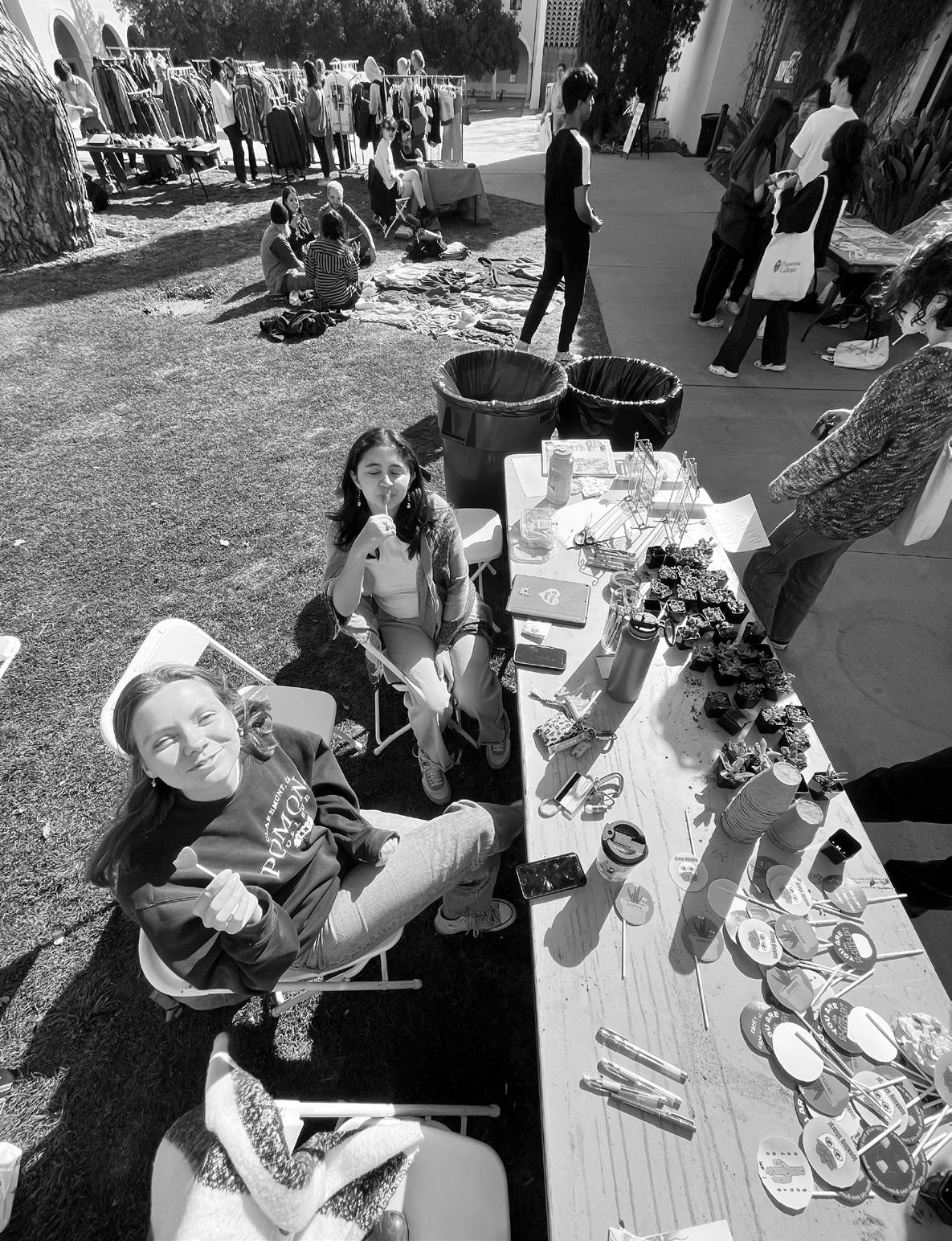
“Everyone knows it’s once a month –– it’s almost become a tradition among the student community,” Duran-Gonzalez said.
Thanks to the flea market, students across the 5Cs have the opportunity to sell their handmade products.
Katie Chao PO ‘25, a jewelry vendor, was inspired to become involved with the flea market for its welcoming environment.
“I loved the supportive and collaborative environment I felt at the market and wanted to be a part of it not just as a customer but as an artist,” Chao said.
Nitschke-Alonso understands the event as an effective sustainability event because it attracts a wide audience.
“The market does a great job of showcasing a collective social experience through sustainability,” Nitschke-Alonso said.
For Chao, the flea market facilitates an important space for artistic expression through community support and appreciation.
“The market offers a space where I can share my art with my peers and also find inspiration for new pieces,” Chao said, “I love checking out what my classmates are creating and get so much joy from sharing my
projects with others.”
Looking forward, Pomona EcoReps is gearing up for Earth Month in April, which Duran-Gonzalez said will be “huge” for them.
Namely, there will be events catered toward students, faculty and alumni all month long, starting with a fundraising kickoff at the Pomona farm.
The event the EcoReps are most excited about for this upcoming month is the Earth Hike at Chino Hills State Park on Sunday, April 23.
“We’re hosting a hike joined with professors with expertise in geology, water politics, environmental analysis and biology,” Nitschke-Alonso said.
The professors will discuss the significance of the area from these perspectives and facilitate a space for shared conversation with student hike participants.
Moving forward, the EcoReps will continue fostering a culture of accessibility in individual sustainable discourse at the 5Cs. It’s important to note that the EcoReps understand the complex layers of exclusivity in sustainability practice and discussion along the lines of socioeconomic status, race and gender.
According to Duran-Gonzalez, a prominent mainstream view of sustainability is to frequently eat organic and locally grown fruits and vegetables.
“That image is neither feasible nor possible, being a college student, particularly for low income students or students of color,” Duran-Gonzalez said. “What we try to do is give people avenues to bridge that accessibility.”
More information about the Pomona EcoReps can be found through their Instagram: @pomonaecoreps, or through event-specific accounts such as @walkerfreeroom and @walkerbook room.
The Oscars aren’t doing enough to fix Hollywood’s issues
After this year’s Oscars, my social media feed was flooded with bitesized inspirational moments and teary-eyed acceptance speeches. In particular, Ke Huy Quan’s win for Best Supporting Actor made waves in my digital landscape –– he was the first Vietnamese-born individual to win an Oscar, hadn’t been employed for decades and lost his health insurance after filming for this year’s best picture Academy Award winner, “Everything Everywhere All At Once.”
Don’t get me wrong: Quan’s win was inspirational and warranted. However, I took offense to how quickly people were able to forget Quan’s struggles in the Hollywood industry simply because he had a golden statue to his name. I felt the same way about Brendan Fraser, who had won Best Actor for his brilliant performance in “The Whale.” Fraser had a similar career path to Quan, leaving Hollywood in 2003 after being sexually assaulted by the ex-president of the Hollywood Foreign Press Association and then, after his hardship, going on to win an Oscar.
Quan and Fraser’s stories should be an indictment of the Hollywood industry, yet the Oscars have managed to appease audiences through their symbolic selections and the myth of inclusion. I say myth because inclusion, in Hollywood, only means including marginalized people in an industry that has persisting issues
of exploitation and violence. This idea is in contrast to real inclusion, which, to me, is improving working conditions for everyone working in entertainment, from the underpaid and overworked VFX artists at Marvel to actors like Quan, who have lived paycheck to paycheck.
My criticisms do not imply that Quan and Fraser’s victories are unimportant. A huge reason why Quan was unable to find work was because of the lack of roles for Asian people, and it could very well be the case that his win will open doors for more representation in the future. I even wrote in my last article about how important the win for “Parasite” was at the 2020 Oscars. Instead, what I have an issue with is the idea that the Oscars care about anything but their bottom line and, even worse, that they represent the stewards of progress and social inclusion. Take the 2020 Oscars as an example. In the nominee announcement, Issa Rae famously quipped, “congratulations to those men” after announcing the best director category. The very next year, Chloe Zhao, a woman, won the best director Academy Award for her work in “Nomadland.” Is it a mere coincidence that after this backlash, they gave the award to a woman in 2021?
Could it be that the Oscars are listening because they care about permanently lessening gender disparities? Or are they listening because they finally received mass criticism
and acted swiftly to maintain their ratings and meet their profit goals? I believe the latter to be much more plausible. Additionally, this year’s Oscars failed to nominate any women for the best director category, furthering my point that their actions are performative and temporary. If you need another example of how arbitrary the Oscars’ nomination process is, take a look at this year’s best actress campaign for Andrea Riseborough. Riseborough starred in “To Leslie,” a film that lacked nominations from the Screen Actors Guild, the Golden Globes and other award shows that act as benchmarks for Oscars’ predictions. Despite her lack of prior nominations and the minimal success of her film (it grossed roughly $27,000 before the campaign), Riseborough used her industry connections to impel the Oscars to snub two potential nominees, Danielle Deadwyler and Viola Davis. Deadwyler and Davis, for their respective roles in “Till” and “The Woman King,” would have made history by becoming the 15th and 16th Black actresses to be nominated for the category as a whole.
After an internal investigation from the academy, they concluded that Riseborough’s nomination shouldn’t be rescinded. This sparked much discourse, especially from people who expected the Oscars to be more mindful of representation following the #MeToo and #OscarsSoWhite controversies.

The ability of Riseborough and her industry connections to essentially manufacture a nomination reinforces the corruption and elitism which audiences criticized the academy for merely two years prior. I don’t blame Riseborough, but I instead blame the academy’s apathy towards these campaigns and the ability for something like this to occur in the first place.
Furthermore, the dominant logic of representation, at least in these awards cycles, consistently bets on children at home pointing to their television and exclaiming to their parents that they will one day be a winner, gripping their fingers around a tiny golden man and taking in applause from a room of people who take themselves too seriously. These awards make people chase an ideal that shouldn’t exist, especially as it pertains to something as subjective as art.
For poor children, especially poor children of color, dreams mostly remain dreams until their reality crashes upon them. Most people who have dreams of working in Hollywood will end up struggling like Quan and Fraser or even worse, unrecognized for their years of hard work because they weren’t part of a project the academy deems worthy enough to be rewarded –– which is exactly why we can’t replace industry reform with symbolic victories. I love films. I love the idea of film as a medium of social change, depicting all parts of humanity
cOUrTESY: rOB cOrDEr/FLIcKr
The Oscars have managed to appease audiences through their symbolic selections and the myth of inclusion.
sincerely and accurately. However, I think that when we put such a cultural emphasis on these awards and sentimental stories, we forget that Hollywood is an industry with its own problems of exploitation and violence. And then we forget that the academy and other entertainment institutions have a deep responsibility to fix these issues. So, if you have any take away from the Oscars this year, it should be the understanding that change comes from the bottom up, and Hollywood is much, much bigger than what is represented in these expensive venues.
Peter Dien CM ’25 is from West Covina, California. He enjoys listening to midwest emo, watching stand-up and playing Go with his roommate.
MArch 31, 2023 PAGE 5 Arts & Culture
cOUrTESY: EMMA NEEB & SAGE WONG-DAVIES
PETER DIEN
corr’s production underscores the material’s timelessness through staging, with ensemble members dressed either in old-fashioned costumes or in contemporary attire such as ripped jeans and t-shirts.
cOUrTESY: POMONA cOLLEGE EcOrEPS
Pomona college Ecoreps is a student branch of the Pomona Sustainability Office, functioning as a sustainability hub for the 5C community and beyond.
BEhIND ThE ScrEEN
Ben and Ansley take Beer League
BEN LAUREN & ANSLEY WASHBURN
Every Saturday at 2 p.m. (but this week at 3 p.m. for some reason) students (OVER 21! ;) ) gather at the shitty field at Pomona College (Mudd Field) to play even shittier better baseball. With beer. Or seltzer (hard af).
This week, Beer League was actually Beer Olympics, which was Beer League with slightly more fun fieldday drinking games between innings.
This week, the upperclassmen defeated the underclassmen 157-3 after scoring six touchdowns and a hole-in-one. However, the underclassmen had more fun and isn’t that what really matters? The answer is yes. Upperclassmen taking Ls left and right.
Boat race boat race boat race. BOAT WHAT?!? Anyway, as I was saying, there were two boat races this week. I don’t really know who won because the teams were un-teamed but Ben said that Ansley Washburn
SC ’26 said that she had a great time.
“I had a great time,” Ansley said. Washburn, Celine Aoki of women’s college Scripps and Ainona Black-Planas from historically women’s college Pitzer won the beer wheelbarrow contest by a mile. Washburn was on the ground while Black-Planas and Aoki carried her legs while chugging beer. It was very impressive and exciting because it is/ was women’s history month. However, every time a man lost to a woman they accused her of cheating.
Also, the WOMEN’s win was even more impressive because the three of them had come directly from a club soccer game against CSU San Bernardino. Claremont Football Club (CFC) had crushed their opponents and won 5-1. Sko CFC.
“It was the best moment of my life,” Washburn said (referring to winning wheelbarrow and getting a medal). “We never lose. We’re the GOATs.” It’s true, they are.
Farold Huson SC ’26 took a fat L in the competition and proceeded to cry profusely. After claiming Ansley was actually a witch, Huson paused the game to conduct a trial which would determine Washburn’s fate.
“I trained so hard for this,” Huson said with tears streaming down her face. “I hate women.”
Meanwhile during the actual game the only person who seemed to actually be trying to win the fucking thing was Ben Lauren PZ ’25 who absolutely dominated on the day. Playing all nine positions simultaneously, Lauren hit the ball literally so far, like I cannot stress how good this guy is at baseball, the fact he isn’t on the team is like, smh. Anyway, Ben said something about how good he is.
“I’m like Barry Bonds if he took steroids,” Ben said.
Ben went 2-2 in the game with a double. His second at bat was wild and wacky as following a double by Harold Fuson PZ ’26, he proceeded to have a 20 pitch at bat for no reason, fouling off 19 consecutive pitches en route to hitting a single.
“We all knew that pitcher is one of the best in the league and I wanted to wear him down,” Ben said, forgetting the pitcher was also on his team.
It all came down to the final inning. The underclassmen were down real bad (what else is new) and the $16 million Beer League scoreboard paid for by Pomona donors read 157-2.
TSLove ❣
TSL would like to thank all of our wonderful readers and commenters for their unwavering support over the years. This is what keeps us going! :)
y’all are so fucking stupid and annoying
@b**********z
Wow great article, whoever wrote this definitely knows how to read and has probably read and enjoyed the entirety of the novel 1984 by George Orwell @e******d
This article is wacky. Do y’all want anarchy?
@b**********f
pee pee poo poo check
@i*********o
Breaking: Larry David seen kissing Rob Lowe behind Carnegie Hall

GERRIT ‘PEEPING’ PUNT
Last week, while filming the 12th season of the hit HBO documentary series “Curb Your Enthusiasm,” a Campus Security officer reported witnessing actor Larry David furiously macking it with actor Rob Lowe.
my first time, and he’s international super-stud Rob Lowe.”
When asked if he would kiss Rob Lowe again, David stammered
so y’all will just print anything now? @c*********1
this is a great argument to bring back writing 50 @b*********e wow this is such an awful take
@m*******t was this ghostwritten by an incel or what@j************e
Wow! This author is out of touch!! Commercial Rap Music s def. a major issue!
K****** S***** J***** R*****
Earning money online is very easy nowdays. Eanrs every month online more than $17k. Last month i have made $19754 from this job just in my spare time which is only 2 hrs a day. Everybody can get this right now and start earning cash online by follow instructions on this webpage.............====)>) https://homecash.*******.app/. R**********t
BUT then despite the game being outside, the lights dimmed and to the shock and awe of the peak athletes at the game, out came none other than recently resigned Scripps president, Suzanne Keen.
“Holy shit, is that Suzanne Keen?” Ansley and Ben and Harold said in unison. Announcing that she resigned for the sole purpose of going pro at Beer League, Keen stepped up to the plate to represent the upperclassmen. After taking 12 strikes, claiming they were “not her pitch.” Keen hit the ball so far it traveled around the world 156 times.
With the unprecedented play, the Beer League umpires declared Keen’s bomb should count for hella home runs and announced the underclassmen as the winners. I know I said the upperclassmen won earlier but that was wrong and I don’t feel like going back and editing it.
Come to Beer League next week to see Suzanne “Aaron Judge” Keen attempt to break the single season home run record. In all seriousness, Beer League is super duper fun. This is NOT a joke.

Campus Security officer Glen Grabowyzkyzyk (the joke is that he’s Polish (don’t worry I have Polish friends)), who stumbled into the slurp sesh reported, “I mean, they were really going at it, I mean seriously sloppy stuff. They just kept going. It was kind of beautiful in a way. I mean, I didn’t know if I should intervene or join! Haha just kidding, don’t publish that.”
David, who was quote unquote “rudely interrupted” said in an official statement to TSL, “Yes, I did kiss Rob Lowe on his sweet sweet Outsider lips. Was I a bit nervous? Of course! It was
Dry lips, little tongue.
Rob Lowe
sheepishly, a ruby red blush crossing his elderly, cherubic cheeks, “Of course! He’s a cute boy. I mean, who WOULDN’T want to kiss him? Hee hee, hee hee.” Lowe on the other hand, seemed less enthusiastic. When asked about his rendezvous with Mr. David, Lowe stated, “Dry lips, little tongue.”
Larry David resigns as Scripps Prez
After just an eight-hour tenure, Scripps College President Larry David announced he was stepping down, effective immediately, in a statement emailed to the Scripps community this week.
A follow-up email from the Office of the Board of Trustees was sent minutes later with additional details, including that Ted Danson will take over as acting president.
The resignation comes after David ran over a student immediately following his initial reception as president.
“Gabi Starr did it too and she’s allowed to stay?” David said, “Explain that.” The “Curb Your Enthusiasm” star was appointed president on March 21, 2023 and resigned on March 21, 2023.
In his resignation statement, David said he is “very sorry for not properly curbing his enthusiasm” and noted that he “feels pretty… pretty… pretty good”
about his tenure.
Scripps students were notably disappointed with David’s resignation as 95 percent of students ranked “Seinfeld” as their favorite show of all time in a recent campus-wide poll. Carrie Avid described her disappointment through tears.
“I was looking forward to seeing what social taboos Larry would commit,” Avid said. “Vehicular manslaughter? Honestly, he could do better.” David will be serving 25 to life in prison with his sentence beginning this Saturday.
The Elder One Approacheth
The time has come.
The Shadow Prince of the Cold Abyss has raised his great black wings to the sky. A pestilence will desolate the land. A foul cacophony of torment will permeate the eardrums of the nonbelievers. The time has come.
The horsemen of death will precede him, their banners raised against a blood red sun. The children will run in fear. They will not run fast enough. The time has come.
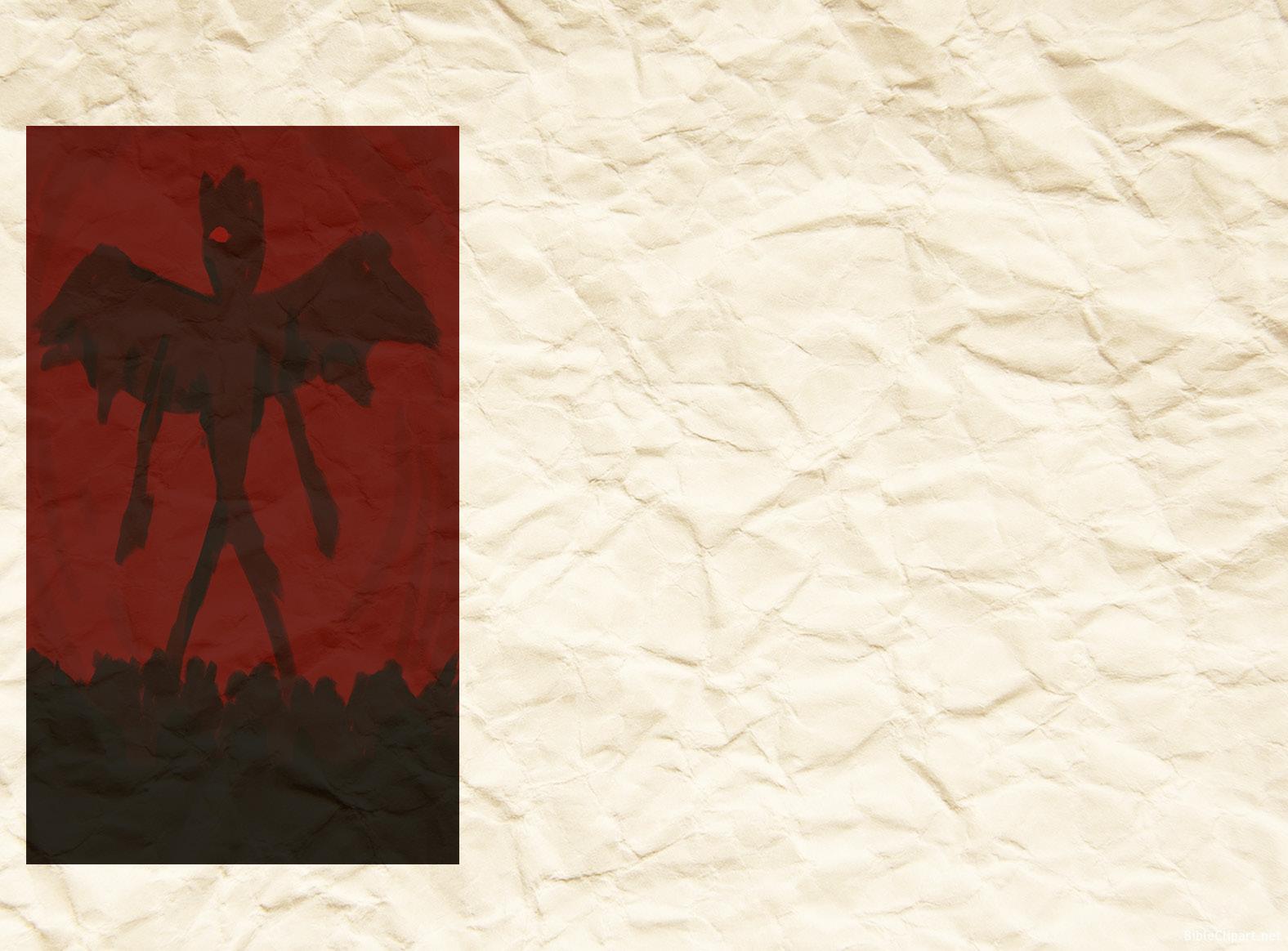
The livestock will perish, the crops will wither. The water will run black with pain and ichor. The citizens will shout to their gods. Their gods will not answer. The time has come. There is no escaping the approach of the Elder One. His descent upon the Earth will be swift and immolating. Your screams will be futile. No one will answer them. The time has come.
Mindful Mondays: Not So Munch
It’s no secret that the Mindful Mondays have been divisive. Athletes hate it. Vegans love it. And people with eating disorders– I won’t even go there. Quite frankly, I’m sick of hearing about it. So, allow me to have the last say: If you really cared about the so-called “Meatless Monday,” you wouldn’t be eating pussy.
As the rising lyricist of the year, Ice Spice, called it, being a “munch,” is not something to celebrate– humans are animals, too! It’s not vegan. It’s not even vegetarian. A TSL opinion recently spread propaganda that there is an underwhelming level of yummilingus on campus. Would we ever say the same thing about cannibalism? Has our liberal arts college activism gone so far that we’ve forgotten lawfulness, let alone basic morality? Do we seriously devalue our women so much that we would eat them and call it #feminism?
Believe it or not, people with vaginas are living, breathing creatures, just like us. Look at their innocent, little eyes. They’re so cute. They deserve more than mediocre mustache-riding. It’s hurtful, sometimes literally. We shouldn’t be cruel to animals, especially unnecessarily. This adult happy meal is also bad for the environment. Yes, for all those practicing an environmentally conscious diet in the hopes of preserving the environment, I call liar, liar, pants on fire. If you’re venturing downstairs on any sort of consistent basis, you are entirely throwing off the natural pPH balance of the nether regions. Typically, a healthy vagina can range anywhere from 3.8 to 5.0 on the pPH scale– also known as an astonishingly acidic arbiter of good and bad bacteria and the ultimate defender against infections that would otherwise thrive in a less acidic environment. But studies have shown that the bacteria from your germy saliva can make the vagina more alkaline while you’re busy giving those Australian kisses, putting that poor pussy at risk of infection or more severe illnesses after the deed is done.
If we’re going meatless, let’s stop cowering behind our fear of being too radical. I want to go all the way, baby! I call for the 5Cs to be more mindful of all animals, regardless of their genitalia. That means that vaginas have rights too, and if we are going to continue to be socially and environmentally conscious eaters, we need to make space for them in the conversation. We cannot keep eating out of both sides of our mouth ––: no meat means no muff!

The student newspaper of the Claremont Colleges since 1889 INDEX: News 1 | Arts & Culture 4 | Opinions 7 | Sports 8 April Fools, 2023 CLAREMONT, CA VOL. CXXXIV NO. 17 ARTS & CULTURE OPINIONS SPORTS
BEllA
pETTENGill • THE sTUDENT losEr
BEllA pETTENGill • THE sillY liFE
DONYUH ANHABATWEED & RALPH LAUREN
sAsHA MATTHEWs • THE sillY liFE
sEX ColUMN
Less Queer Discourse, More Gay Sex

SAPPHO FRAGMENT
Every day I wake up to “they/ them” this, “trans bathroom” that. At a point, the question arises: what ever happened to hot gay sex? Whatever happened to lesbian boobs in my face? As a liberal arts student, I love critical discourse as much as the next guy. I’m always at the library reading, like, Judith Butler or who-
 My queerness is constructed at the intersection of me and femme scrippsie ass.
My queerness is constructed at the intersection of me and femme scrippsie ass.
A Letter from Gabi Starr
Dear Class of 3023, Some of you have gone through many obstacles to get where we are today, our school’s most beautiful venue, the empty plaza outside Frary. I know, because I have also gone through many obstacles to get here today. For instance, on the way here, I wasn’t paying attention and accidentally walked directly through the Skyspace fountain. But while the water may have soaked my hip, cool Birkenstocks, that’s okay, because barefoot is legal! What was I saying? Ah, yes, obstacles. Graduation is comin’ up and some of you will go through many obstacles after you walk that stage. Or even as you walk the stage. If I stick my leg out to trip you before you shake my hand, just roll with it. Because life is a trip, you know? I remember my first trip. So why not just go ahead and get it started before you even move to wherever it is you’re going. Tucson? Is that where the kids are moving these days? I love Saskatchewan. The only thing that could improve it is introducing the most beautiful creature, the greater sage-grouse. Commencement is a time for introspection. It’s a time for thinking big thoughts about who you are, who you’ve become, and what you’re doing here. What was it Zuckerberg said? Something about meta? Do something meta. Wait, has anyone seen my salad fork?
Today, I ask you, what are you doing here? Here, at Pomona College, the place where 120 years ago, Theodore Roosevelt dared us on the steps of Pearsons to dream big, fight hard and never capitulate to our many enemies. Here, at Pomona, where in just seven minutes, an alien spaceship will abduct four of us and take us to Risa, the rain-soaked planet orbiting Epsilon Ceti B where every day is a constant orgy of pleasure and fear. Truly, there’s no time to waste.
which queer identity is constructed. Personally, my queerness is constructed at the intersection of me and femme Scrippsie ass. Where are the safe spaces for me?
It is often that I am in class and must ask professors and my peers to respect the choices of my pronouns. And, while I respect people’s efforts to make me feel seen in this way, it is equally as important to make sure my tits feel seen too.
Adfertiesment
PERSONAL ADS
CMC seeking SC
I’m a man. My starting salary is $200,000 at my dad’s oil company.
Seeking: Leftist trophy wife with cognitive dissonance.
PO seeking PO
My extreme passion for learning and curiosity have fueled my passionate academic pursuits, earning me numerous awards and scholarships. As a self-proclaimed disruptor, I’ve presented my research at numerous national conferences and act as a role model for my numerous peers and professors. I am grateful for the many numerous experiences and opportunities that have shaped me into the student I am today.
Seeking: Me, or the closest copy I can find. Serious inquiries only.
SC seeking Mudd
I’m straight, but I self-identify as cottage core. I’m actually always outdoors, since my family owns three cabins. Don’t worry, I do mutual aid.
Seeking: Emotionally unavailable Mudd student. Must be 6’2’’ or above and carry an unnecessarily large backpack
MUDD seeking Recruiter
3.92 GPA (C- in Writ 1), hacked the US govt. (twice), created the first sentient robot then made it experience death
Seeking: Lockheed Martin recruiter, my Microsoft offer was recently rescinded due to digital footprint (the bad reddits)
PZ seeking PZ
Wild. Free. Real. Kind. Full Send. I recently threw away my flip phone and now only communicate via telegram, but you can find me at the slackline.
Seeking: FWB 2 B my GF NSA
CPP seeking 5C

Seeking: 5c student, I ran out of tinder matches in my area

fact, ask anybody and they will say that. But if we as a community are really intent on cultivating a queer friendly environment, we must be willing to give hermetically sealed Dyson vacuum suction top to our queer brothers and sisters. What did Rupaul say? We are born naked and the rest is drag. So take off those gendered signifiers, baby girl, and let’s get some solidarity going. —
But there is time to hold up our glasses and say — cheers, to the class of 1923. Yes, hold up your glasses. I probably should have put my glasses on before getting up here. I can’t read a word of my script.
Hug and kisses, Your loyal president
G. (George) Gabrielle Starr batlh bInajjaj
@sontagism
Opinion: I have so many opinions

Rejected TSL opinions
Every once in a while, TSLl publishes an opinion piece that forces readers to say, “If this is what they’ll print, I’d hate to see the stuff they reject.” Here, readers, are a selection of guest opinions we politely had to decline. Don’t say we don’t have any quality control.
Opinion: I don’t want meals swipes, I want Blow Jobs at the Pit Stop
Opinion: I support my sugar babies in unionizing
Opinion: I should be able to get Adderall inserted into me like an IUD at SHS
Opinion: *Nuzzles you* :3 hiiii <3 ^-^
Opinion: Does anyone else think that gosh darn clit is too damn hard to find?

DENIAL IN A TWINKIE
Every single day, without fail, I think. I think about several things, from things to other things. To be brutally honest, I would say that I even have
opinions. Maybe that’s just me.
Occasionally, I find myself pondering my experiences as I consider a variety of ideas. Conceptually, I am definitely opinionated, but opinionatedly, I am conceptual.
I wanna Corner TSL’s editorial board reached out to KKR demanding they stop dickriding the oil industry. KKR’s public relations offered their comment: Ok girl and im bouncing and creaming on it now what
Athletes of the Week
Ben Lauren PZ ’25 New York City (ass city) Yankees Suck Beer League and high school sports

Ben Lauren (known woman hater) PZ ’25 won Athlete of the Week after participating in his third beer league. He hit both a double and a single and also cheered on his teammates with enthusiasm. Great teamwork!!!! He doesn’t hate women!!!!! Even though technically he is supposed to hit lefty because he played in high school, he did not and therefore got the chance to showcase his skills. Slay Ben. Go the fuck off. In the past, Ben just said he also did other impressive baseball things at beer League but baseball terminology is very confusing. Ben is a great sports editor at TSL and also works for Pitzer to do media stuff. Ben is awesome.
Claremont-Mudd-Scripps
Ansley Washburn SC ’26 Boston sucks (worst city, so cold, Ansley also smells?) Club Soccer and Beer League

Ansley Washburn (also known woman hater?!?) claimed the illustrious Athlete of the Week title after winning rookie of the week in this Saturday’s Beer League showdown. Ansley hit a single the first time she ever swung a bat which is like hella impressive. She he wanted to hit a home run, but couldn’t show up the rest of the competition with her phenomenal feat of athleticism. Ansley said she made an unassisted triple play but I didn’t see it so I just took her word for it. She also scored a goal or something in her soccer game earlier against SCU San Bernardino but I don’t really know about soccer. Anywho, Ansley rocks.
Corrections: TSL’s previous issue did not feature its usual enigmatic little buddy, The Snozzler. To make up for it, we gave you two extra Snozzlers, stacked Goomba-style. It won’t happen again.

TSL regrets these errors.
likes this message. sAsHA MATTHEWs • THE sillY liFE
April Fools, 2023 pAGE 7
Pamoana-Pizer
Listen. I respect women. In sAsHA MATTHEWs • THE sillY liFE
Sappho Fragment CM ‘24.5 ever. Structuring gender dynamics and all that. But what about the structure of the dynamic between me and hot Harvey Mudd he/theys? We must constantly ask ourselves about the intersections at
Mistah TSL addresses the hate comments.
‘Traditions that Anchor You,’ Pomona Student Union share
CARTER SOE
Snuggled up in blankets and pillows as each student held a hot cup of tea while nibbling on small treats was the perfect vibe on a cozy Thursday night here at the Claremont Colleges. As they all gathered around the conversation pit of Pomona College’s Women Union room, getting ready to share their stories, a sense of community started to unfold between them. Bridging together the gap of lost time during the pandemic and life back on campus, Pomona Student Union (PSU) aimed to foster a culture of active citizenship and empathic dialogue across all 5C students through their new series “Story Hour.”
This week’s theme: “Traditions that Anchor You.” Whether these traditions embody annual family get-togethers or consist of the playful ones that bring out our little quirks were all encouraged during the event. Attendees shared their stories, ranging from going on long walks up and down their driveway to reconnecting to their lost ancestry of their homeland.
Co-presidents of PSU, David Ruiz PO ’24 and Aditya Bhalla PO ’23 along with board member Trisha Gongalore PO ’25 put together this series in hopes to foster dialogue on current and critical
NEUrONAL NEWS
their stories
issues going on in the world, in academia, or in the 5C community, while establishing a forum for people to talk about current events and learn from one another.
“It kind of just came from having dinner with friends. It’s been something that really anchored me during my time here at Pomona.” Gongalore said. “Our conversations span more than just what’s happening in our personal lives but also just about policy and climate change. I guess those conversations made me realize the power of storytelling, because it wasn’t just like conversations about these things unlike on a policy level, it was also about hearing the personal stories like the anecdotes that really made these topics feel real and relevant.”
Gongalore saw a lack in public spaces at Pomona where students can take the opportunity to share their stories in an environment that feels safe to them while being heard by others.
“But I think creating a space where even strangers can come together and share those thoughts was really what I wanted to come out of this event and I hope we did that today,” Gongalore said. “We are still in a strange time where a lot of people are feeling isolated, but
also where we haven’t acknowledged what we’ve been through as a community,” Ruiz said. We’re really hoping to establish that space and to open that to all students from all over the 5Cs to remember that we are still going through it and we’re still getting into the rhythm of life as students and just as human beings.”
As a storyteller himself, Ruiz talked about how running has guided him as a hobby through not just one of the most difficult times of his life, but also some of his best moments. From the beginning stages of the pandemic, to taking his gap year and traveling across the country to work in politics and activism, Ruiz happily continues to run in the mornings around the campuses.
“While PSU can be really informative for students and provide some sort of academic insight for students, it wasn’t really serving the needs of the student body as it’s needed right now,” Bhalla said. As a Speaking Partner at Pomona’s Center for Speaking, Writing, and the Image (CSWIM), Ally Huang PO ’25 attended this event in hopes to partner up with PSU and encourage open dialogue between Pomona students.
BELLA PETTENGILL
and also have been meaning to spend more time in the Women’s Union ––a very lovely space! –– so I thought I would come by and observe, taking some notes for the CSWIM,” Huang said. “I wasn’t actually expecting to share a story of my own, but I was really inspired by the other attendees and the energy felt very accepting.” Huang opened up, sharing her story of building her relationship with
her mother through dinner meals.
“Even though we all discussed our personal, highly individualized experiences, I realized there were a lot of common threads that wove through multiple stories,” Huang said. “There was something I could resonate with in every person’s words, and it was so lovely to see others’ passion as they talked about something deeply important to them.”
HANNAH FRASURE
These memes are so widely shared that journalists over at major media outlets like New York Magazine and Wired have made recent attempts to explain them.
But no one has explained that this bizarre trend combines Gen Z’s nihilistic outlook with a common tendency to defect to a scientific understanding of the mind as one with the brain.
I’m sure many of us think of the mind and brain as one. After all, even though some philosophers might want to block this view from sight, it remains the most influential among cognitive scientists.
According to renowned philosopher of mind Jaegwon Kim in his aptly named book “Philosophy of Mind,” the cognitive sciences require “appeal to lower-level physical-biological sciences,” a view which is the sciences’ “default.”
And though there’s yet to be any study showing what Gen Z thinks about the mind-body problem, I assume this view is probably the default for a good number of us. Why?
A recent study conducted across 25 countries about which institutions are most trusted by different age groups found approximately half of the Gen Z age group said scientific institutions. So, it’s reasonable to assume that around half of us trust the default position of scientific institutions when it comes to the mind, as well.
And when you look at trending Gen Z memes about mental activity, it becomes clear how this default view is seen by many of us.
For instance, one common brain meme format shows the word “whomst’d” — an artificial contraction of “who” — pictured next to the brain that appears to have the most wrinkles and synapses. What else would those electric-looking lines shooting outside the brain represent? If whomst’d were a real word, it would involve knowledge of the most number of words compared to all the other contractions that are listed. So one might presume “whomst’d” requires the most intellectual prowess to master in use, compared to shorter contractions.

But why is it next to the brain on the bottom? The current consensus is that the more brain wrinkles there are, the greater the brain’s surface area and the more synapses there are. More synapses means increased connectivity between the brain’s functional regions and faster information processing.
So you might think: the wrinklier the brain, the wryer the person.
But that’s not quite how intelligence works — the countless scientific theories that do seek to explain it are far more complex and do not all solely rely on physical mechanisms.
Nonetheless, this consensus about brain wrinkles and information processing speeds seems to have taken a chokehold in the Gen Z meme-sphere. Now, you can probably understand the “smooth brain” memes as well — even as their logic might not be the most sound.
The memes strip down strife to the inevitability of our internally flawed hardwire. We laugh not because our generation has managed to avoid more suffering than previous ones, but because we understand its source better. Younger Americans trust scientific authority more than older Americans, so more of us are likely to see the source of mental suffering, like all other mental activity, as the brain —
MAX rANNEY • ThE STUDENT LIFE
As a Vice article explains of a 2021 study of over 10,000 Gen Zers across 10 countries:
“Fifty-six percent of people surveyed said they agreed with the statement that humanity is doomed, while 75 percent said they believed the future was frightening.”
So it’s not a surprise that many of our brain memes represent this outlook.
Another meme uses a screenshot from “Rick and Morty,” a show almost everyone in Gen Z has heard of, is accompanied by text describing dissociation — a condition with neurological underpinnings wherein one loses touch with reality — as blissful. I say “our” since this was also posted by another generic Gen Z meme account.

I’m not even remotely suggesting anyone embrace this nihilistic outlook. But unfortunately, I have a word limit, so I can’t offer existential counseling.
Hannah Frasure PO ’24 often sits around pretending to be The Thinker is a philosophy major who began as a neuroscience major.
Poet Chen Chen doesn’t just play with words. He throws them up in the air, rolls around in them and then plants them in the soil. He luxuriates in language. His debut poetry collection, “When I Grow Up I want to be a List of Further Possibilities” (2017), is split into three sections, with poems ranging from the everyday — visiting the Syracuse Zoo — to the irreverent — Chen’s relationship to religion — and the deeply personal — Chen’s family, boyfriend and experience of queerness.
However, when I was first introduced to the book, I was suspicious.
Last Valentine’s Day, Honnold Mudd Library had a “Blind Date with a Book” display featuring books wrapped in brown paper labeled with what was supposed to be a mysterious and enticing theme. I chose a book labeled something like “Immigrant Experience” or “Generational Trauma.” I was skeptical –– did I really need more of that?
Thank goodness for the librarians. I was hooked after reading the very first poem.
Called “Self Portrait As So Much Potential,” the poem begins: “Dreaming of one day being as fearless as a mango / As friendly as a tomato.”
I can’t convey the delight that these words brought me when I first read them. Chen uses simple images to convey a childlike enchantment with the ordinary –– he made me think about these everyday fruits differently. He’s right –– mangoes are fearless! Tomatoes really are friendly!

And yet, behind these deceptively simple lines is a sense of longing, as Chen dreams of being different, being more than he is.
Near the end of the same poem, Chen writes: “I am not the heterosexual neat freak my mother raised me to be. / I am a gay sipper, & my mother has placed what’s left of her hope on my brothers … They will be better than mangoes, my brothers.”
Here, Chen writes with an awareness that his queerness means he is not the child his mother had expected, or maybe even wanted. This last line takes on a bittersweet longing –– he wishes he could be like his brothers, even as he also acknowledges that he will never be.
Many of the poems in “When I Grow Up” are like this –– they contain wonder and wit alongside a deep sense of sadness or bittersweetness.
This contrast is what hit me so hard about Chen’s work. Reading his poems was an intensely emotional experience. Often, I’d laugh out loud at his quirky and silly turns of phrase.
For example, he describes the sound of the sea as “a sort of sensual moo.” Or, in the poem “I’m Not a Religious Person But,” Chen considers his relationship to God, writing: “My mother said she is /
pretty sure she had sex with my father so I can’t be some new / Asian Jesus.”
Chen’s facility with words thrilled me. But as I kept reading, I found myself on the verge of tears as he asked deep, vulnerable questions about his relationship to Chineseness, queerness and his parents.
One poem exemplifies this complexity particularly well.
“First Light,”reflects on Chen and his family’s flight from China when he was three. Chen writes this poem because he lacks memory of China, which he describes as his “vast invented country, / my dream before I knew the word ‘dream.’”
However, in the poem, this lack of memory becomes a space of imagination and adventure, as he fills in the gaps with dramatic cliches from kung fu movies.
For example, Chen writes: “I like to say we left at first light/with Chairman Mao himself chasing us in a police car / my father fighting him off with firecrackers … I like to say we left at first light, / we had to, my parents had been unmasked as the famous/kung fu crime-fighting couple of the Southern provinces.”
Many of these images are clichéd stereotypes from Chinese and American pop culture. But by inserting his own family into them, Chen both makes fun of these clichés while also giving them new meaning as stories he can claim for himself.
I relate to this poem because my own memories and ideas of China are largely mediated through America; other than my father’s stories, what I knew of China growing up was what I learned in American public school or through American media.
I mourn this loss, but the campy ridiculousness of the imagery in the first half of “First Light” showed me how spaces of loss are also spaces of playful possibility.
Then, the poem takes a turn, as Chen describes the night when he was 13 that his mother slapped him for being gay and his father told him to get out of the house.
“I cried & ran, threw myself into night. / Then returned at first light,” Chen writes.

By repeating the phrase “first light,” Chen relates his flight from the house to his parent’s flight from China. Although this is a moment of emotional and physical violence for him, it also opens up more empathy for his parents, as the poem goes on to discuss the hardships that leaving China brought on his parents’ relationship to their own families.
Unlike in kung fu movies, there are no clear bad guys and good guys in Chen’s writing. His poems capture the messy overlap between his parents’ pain and his own.
But the sadness that I felt reading “When I Grow Up” is inextricable from the joy. This is the power of Chen’s writing –– to read it is to experience the best and worst parts of being alive.
Reia Li PO ’24 really likes mangoes, but her favorite fruit (other than her friends) is any kind of berry. She especially likes blackberries.
LUcIA MArQUEZ • ThE STUDENT LIFE
PAGE 8 MArch 31, 2023 Arts & Culture
“I’ve really enjoyed events like open mics and talk-stories in the past, • ThE STUDENT LIFE
Ever wondered why there are so many memes about the brain with dark, self-effacing undertones?
the default view of cognitive science. But since this place is within, it is easy to feel like we must be intrinsically cursed — hence the tragic overtone.
What’s our obsession with angsty brain memes?
The whimsy, love and pain in Chen Chen’s poetry
REIA LI
corr’s production underscores the material’s timelessness through staging, with ensemble members dressed either in old-fashioned costumes or in contemporary attire such as ripped jeans and t-shirts.
QUEEr ASIAN rEADS
When it comes to post-break testing, ignorance is not bliss
a bigger disservice to common convenience than the health and wellbeing of students to institute a testing policy. Keep in mind that this testing policy has been in effect every break prior, adequately taking into account the increased COVID risk inherent to school-wide vacation.
The rationale for this statement, as well as other changes to COVID policies discussed in the email, is that these decisions were made in accordance with Los Angeles County’s guidelines. This is generally a reasonable way to make decisions about on-campus COVID policy. But there’s one major issue with likening the Claremont Colleges to Los Angeles County as a whole: there’s no such thing as a LA County spring break. The real world doesn’t get to take a break from the pandemic, so why should Pomona be any different?
difference in our environment while deciding how to best apply LA county’s guidelines. Administration boasts that their nonsensical quarantine policies prioritize student health, leading to an assumption that this care for community safety would translate to testing policies. Instead, the rules only apply to those who genuinely prioritize public health and continue to test, especially when symptoms arise.
A rational decision would be to enact more caution after the break and require students to test. But maybe we should have expected this — after all, Pomona doesn’t have a stellar track record with rational decision-making regarding COVID and student health and wellbeing.
The 5Cs could be facing its biggest COVID-19 outbreak yet — but no one would know it.
On Monday March 20, you were probably reminiscing about dancing in Cabo or traipsing the bustling streets of some other getaway when you got the Outlook notification. In an email to the Pomona College student body, there was a reminder that testing after spring break would be just like any other week: optional.
In 1742, Thomas Grey wrote,
“Where ignorance is bliss, ‘tis folly to be wise.” Based on the recent approach to dealing with COVID-19, Pomona agrees.
The problem is that last week wasn’t any week and shouldn’t have been treated as such. It was the week after spring break in which hundreds of students flocked to destinations around the country and across the world. In a normal week, the school’s testing policy does not have to account for quite so many students embarking on long-dis -
tance flights or spending time in clubs packed to the brim. It is inevitable that students would have been exposed to COVID in their times away from Claremont, but administration is failing to appropriately respond to this level of risk.
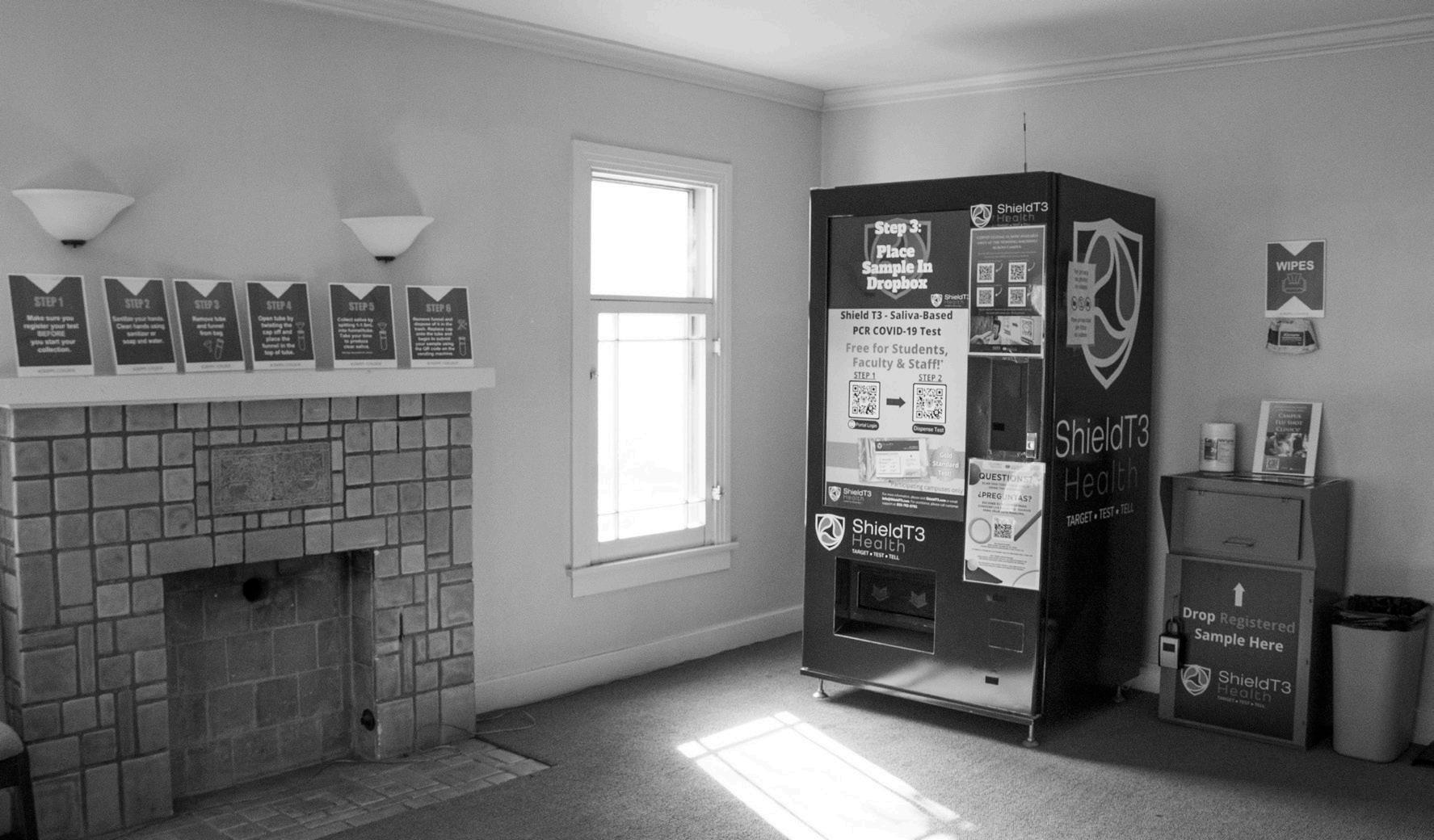
In the aforementioned email to students sent to students, Dean Avis Hinkson wrote, “First, let me confirm what has been in place since the start of the spring semester and will continue.” This statement is framed as though it would be
As with any moment in the pandemic, COVID cases vary widely across the country. During this week, Pomona is bound to get an inaccurate picture of COVID cases on campus by looking at LA County case counts as a reference, overlooking the fact that most students likely weren’t even in LA County during the break.
Pomona’s dismissal of COVID is a striking combination of recklessness, privilege and ignorance. Instead of discounting pandemic management altogether, the college should attend to the real-world
Pomona now relies on an honor system for students to test, but given the college’s blunders with its quarantine policies, it will be no wonder if testing rates are low. This leaves vulnerable individuals, such as those who are immunocompromised, guessing about whether the campus is a safe environment to be in right now. Pomona cannot rely on students to test, even when they become sick, if they continue to ignore student feedback on these policies. Pomona’s administration is actively harming community wellbeing.
Maggie McBride PO ’23 is a senior majoring in psychological science. She would like to thank the creator of 5C Friend.
The medical residency program has to catch up to physician shortages
“Not all angels have wings, some have stethoscopes.” You may have seen this quote plastered on the wall of your doctor’s office. It may have even inspired you to go premedical, shoot for residency and start planning your future life as a physician. But don’t hold on to those dreams too tightly — chances are, you won’t make it.
The United States is entering a massive physician shortage. According to the Association of American Medical Colleges, there may be a shortage of between 37,800 to as much as 124,000 physicians by 2034. So, if doctors are so important, then why are there so few? It has nothing to do with waning interest and everything to do with an inaccessible medical education system that actively crushes aspiring doctors.
Burnout syndrome is no stranger to 5C students. The American College Health Association found that 51.7 percent of college students report significant stress from being overwhelmed. Of course, juggling an academic, social, extracurricular and healthy lifestyle can be overwhelming. For premedical
students, who are expected to receive excellent grades, conduct research, join clubs and promote leadership, alongside volunteering and maintaining a social life, staying afloat –– to understate it — is tough. For those who receive financial aid, an additional part-time job –– or two –– is added onto the plate is even tougher. And if you’re a premedical student, college graduation isn’t the end goal — it’s the starting line. The race is just beginning.
Let’s say that our hypothetical premedical student graduates college and manages to matriculate into medical school.
Four more years of burnout culminate in the infamous Match Day, where graduating medical students are matched into their top residencies. Tough luck. Only 9 percent of students from allopathic and osteopathic medical schools get into their top choice programs.
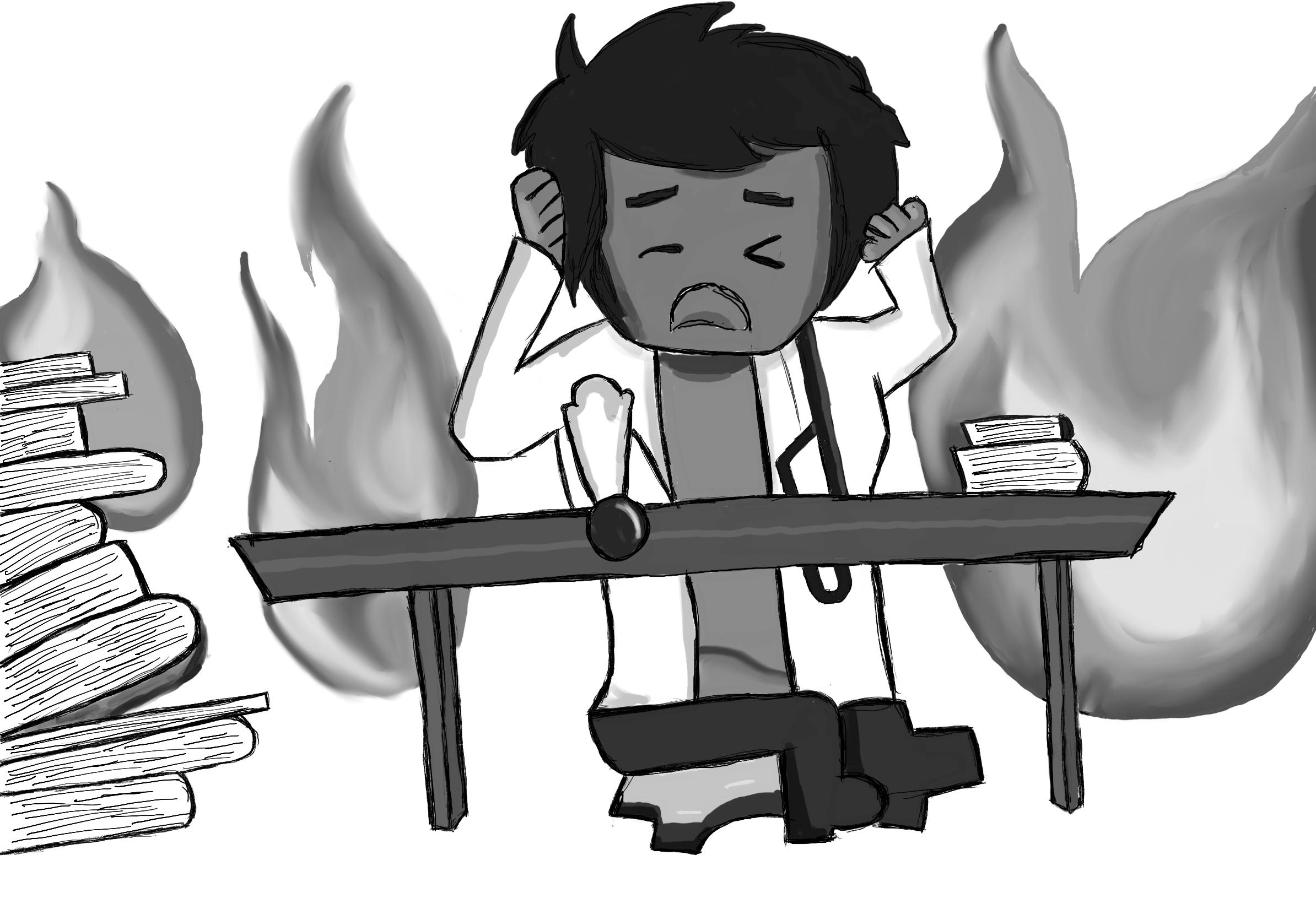
Applicants have to fight for limited positions in residency.
Those who don’t initially get into a residency have to apply through the Fellowship and Residency Electronic Interactive Database Access System (FREIDA). Even though there’s a growing number of medical
school enrollees, the residency system hasn’t caught up.
This effectively means that there are more qualified physicians graduating from medical school than there are spots in residency programs for them to match into. The only way to fix this is for residencies to undergo dramatic systemic change. If that means the number of residency spots needs to increase, then so be it. All doctors who put up with four years of undergraduate burnout and graduate from medical school deserve to match into a residency program. Nobody should ever find themselves scrambling during the Supplemental Offer and Acceptance Program (SOAP).
For the sake of the game, though, let’s say that our hypothetical now-doctor does match into residency. The expected salary for residents is $56,396 per year. On average, that amount of money is the result of 80 hour work weeks, often consisting of 24 hour shifts. The problem? This dough doesn’t come close to tackling student debt: The average debt for the Class of 2021 residents was $200,000 — not including undergraduate debt.
It is unethical to pay doctors near minimum wage while they are loaded with medical school debt and tasked also with supporting themselves. After all, not everyone has the privilege or opportunity to work near their support systems — some folks may not even have a safe space. As the cost of living goes higher, wages need to adjust to reflect that. Until then, residency conditions will continue to weed out competent and accomplished doctors.
Even if our hypothetical medical student is privileged enough to afford residency, they are not spared from the health effects of the program. Residency, in its current form, is round two of burnout — with even further-reaching consequences. Stress is proven to greatly contribute to — if not directly cause — chronic health conditions such as diabetes, heart disease and depression, which are, ironically, many of the diseases that the doctors-in-training are trying to cure in the first place. In fewer words, residency conditions are landing doctors in hospital beds. Chronic health conditions impede the ability of future physicians to treat their patients.
“Study after study shows that sleep-deprived resident physicians are a danger to themselves, their patients and the public,” Dr. Michael Carome, Public Citizen’s Health Research Group director said, according to Forbes. Nearly all the existing scientific literature shows that a lack of sleep impedes performance, so why are we making those who have lives in their hands sleep deprived? Do we want them to accidentally suture the wrong wound? I sure as hell don’t. If our hypothetical premedical-turned-sleep-deprived-resident proves anything, it’s this: Being a doctor is becoming increasingly inaccessible. With our future doctors being overworked, underpaid, burnt out and not able to match into programs, it’s no wonder that there is a shortage of physicians. Saving lives has become the least desirable job in the world, and for good reason. How long before we flatline? I don’t want to find out — but the way things are trending, we might not have a choice.
Joanne Oh PZ ’25 is from La Canada, California. She loves drawing, reading and memorizing Organic Chemistry mechanisms.
March 31, 2023 PaGE 9 Opini O ns
JOaNNE Oh • ThE STUDENT LIFE
JOANNE OH
FLOrENcE PUN • ThE STUDENT LIFE
MAGGIE MCBRIDE
Pomona announced that covid testing after spring break was optional. Maggie McBride PO ’23 argues that this is a risk to community safety.
Editorial Board: Keen’s resignation should be a wake up call for Scripps
Scripps College President Suzanne Keen resigned last week after just eight months in her position. That’s less time than a full-term pregnancy. That’s less time than it takes to experience all four seasons. Although to be fair, her predecessors haven’t lasted too much longer. Keen makes this the third resignation in ten years for the Scripps Administration.
The instability of the Scripps’ administration echoes a larger, national trend for women’s colleges — a trend toward obsolescence.
Keen’s resignation is during the same school year that the number of U.S. women’s colleges plummeted to 31. That’s down 86.5 percent in the last 75 years, such that women’s colleges now make up only 0.7 percent of colleges in the United States. The Daily Beast called it “the fight to save women’s colleges from extinction.” “Are women’s colleges doomed?” NPR’s headline reads.
We don’t intend to fearmonger, but Scripps’ excessive presidential turnover naturally begs the question: How much do we care about the future of Scripps, or women’s colleges everywhere? With the security of the institution continually hanging in the balance, we ask that all 7C students pay attention. We ask that students demand Scripps and all other 7C administrations prioritize the educational opportunities for all students and applicants that aren’t cisgender men through their actions, not just their words. To be clear, Keen’s resignation is something to be outraged about.
To add insult to injury, Keen’s resignation has been shrouded in secrecy. Students that have been vocal about their justified concerns of instability have been met with little to no answers. She declined TSL’s request for an exit interview and did not provide any further information aside from saying she would return to Scripps in 2024 as a professor.
We can recognize that Keen, however, is not solely to blame for the lack of transparency. It’s not a
presidential failure, but an institutional one. Whatever the reason for Keen’s resignation, we take issue with the Scripps Board of Trustees and current administrators’ delayed and evasive response to being held accountable for the institution’s glaring instability issue.
It has been two weeks with minimal clarity and accountability since Keen’s resignation.
Scripps Associated Students just announced on March 30 that an open conversation will be hosted surrounding the presidential transition. But we fear this may be too little too late. While we hope this conversation may provide the insight we’ve been waiting for, the previous decade of uncertainty has given us little optimism.
Her resignation is more than just an institutional embarrassment. Keen’s resignation is a wake
up call. The legitimacy of Scripps’ mission to “secure … through its actions and the services it provides to students, faculty and staff, the widest appreciation for all groups and individuals; to combat discrimination,” is at stake when it fails to consistently provide the resources and administrator to ensure that security. So, Scripps, we ask you: How important are your students, faculty and staff, really? What will you do to “secure” consistency for them?
We are alarmed. Our concerns are not only large scale about preserving the sanctity of spaces designed for the systematically disadvantaged. On a more immediate level, constant presidential turnover necessarily impedes any institutional progress. Scripps prides itself as being internationally recognized as a “leader in women’s liberal arts education,”

but how can it lead with no lead-
ership? There is no leader to direct the future of the institution or any long-term progress — whether that be increasing tuition affordability or sustaining new departments. Without any presidential consistency, students and faculty are left helpless in their demands and effectively forced to maintain the status quo. And even that is, admittedly, the best case scenario. If the national trend is any indication, at worst, administrative instability and failure to meet student demands could eventually swallow the institution and its history entirely. That exact scenario recently befell Mills College in Oakland, CA, causing it to merge with Northeastern University in 2021.
It’s not difficult to imagine Scripps as a debilitated institution with limited administrative resources,
simply becoming a leg of its surrounding colleges. To some, the thought of that slippery slope may not be as alarming as we are making it out to be. What could be so bad about everything being co-ed?

To that, we circle back to what we believe to be the heart of this issue:
How much do we care about preserving and prioritizing the educational interests of all students that are not cisgender men?
For many Scripps students, including our own editor-in-chief, the institution offers a residential safe haven and a learning environment that is conducive to those that have been historically disadvantaged. It’s an institution designed directly in reaction to oppression, and since its inception, has aimed to work toward educational opportunity and justicial progress. Inhibiting the Scripps administration, let alone dismantling it, will not create equality. Misogyny still prevails, hence the need to prioritize spaces for those affected by it.
So, please believe us when we say that the failure to prioritize the health of the Scripps administration is a direct obstruction to progress for the institution and addressing patriarchal spaces at large. It is not dramatic to demand more attention for this negligence.
Scripps students, faculty and staff deserve better. It’s completely unacceptable that some of the most vulnerable members of our society can be met with such little accountability, clarity and even less consistency. The health and future of Scripps should be a concern to everyone at the 7Cs. The institution’s success relies on our continuous commitment and concentrated efforts to show that –– yes, Scripps is important, and the 5Cs cannot and will not allow Scripps to be treated as the weakest link. We cannot let Scripps continue to rot from the head.
TSL’s editorial board is comprised of its editor-in-chief and two managing editors and does not necessarily represent the views of other TSL staff members.
Jasper’s Crossword: One thing about me...


68. “srsly?”
69. Angry kind of fit
DOWN
1. Guano, indelicately
2. MMA fight’s locale
3. Risky way to buy a house
4. Utterly useless
5. Foregone 1.1 ounce iPod
6. 8-foot, lime green Teletubby (is it not disturbing how tall they are??)
7. Run off together
8. Grocery stores with speedy checkouts
9. Word with bowl or jacket
10. Most of Libra szn.
11. ___ Miss (school nickname)
12. Disfigure
15. Stage’s backdrop
19. Nonchalant
21. Obstacle for a high-tech break-in
24. They might be delivered at a bar?
25. It’s before before fix
Discourse
60. It originally had eight stripes, but now usually has six
63. Split like a fork
64. RAs might take your candles from here (they did it to my roommate once >:( )
65. Ward of TV dramas 66. “Well, end of ___” 67. Fruit that’s often topped with other fruit
26. Like a good “Simpsons”
Snow
40. Singer-songwriter DiFranco
41. Title for Pepper of the Lonely Hearts Club Band
42. Brian of “Music for Airports”
45. They disseminate WiFi
46. “Back when I was a young whippersnapper...”
48. Captain Hook’s pal
49. Feudal workers
51. The press might grill one?
54. Stella of an acting school
55. Horan who just performed for Biden
56. Statement a 60-across in someone’s room might make
58. Port for a stream?
59. Bryce Canyon’s state
60. This now means “kissing” but briefly meant “Palm Pilot”
61. Giant mythological bird
62. Flatow hosting “Science Friday”
LAST WEEK’S ANSWERS
PaGE 10 March 31, 2023 Opini O ns
JaSPEr DaVIDOFF & JJ hOFFMaN • ThE STUDENT LIFE ACROSS 1. What the buffalo said when his kid left for college? 6. Agcy. concerned with trafficking 9. Banshee’s prognostication 13. Law professor Hill 14. Misfortunes 16. Bruins’ campus in Westwood 17. Enter a wrestling match 18. One with episodic opinions 20. Marching band’s intended formation? 22. They might be ‘eaten’ in disbelief 23. Sailor’s affirmative, in some cases 24. HMO alternative 27. “If you say so...” 29. The Temptations are talkin’ bout her 31. Hamilton’s note 32. Sauce you can make with carrot tops (try it!) 36. Ran the show, briefly 37. Meme that breaks down something’s essential aspects... or a hint to 18, 20, 58 and 60across? 41. Look like 43. Kingpin of “Succession” 44. Largest sch. in the smallest state 47. Happy geologists feel how this rock’s name sounds 50. Japan, in Japan 52. Amos who sings “Flavor” and “Crucify” 53. Total jerk 57. One might get hit up for a donation 58. Topic of Vaccine
35.
URL 38.
39.
episode, probably 28. Place for a soak or steam 30. Truck brand with the Sierra and Canyon 33. The Cards’ city 34. Macero who produced “Bitches Brew”
End of Wikipedia’s
“Didn’t wanna know!”
It was run by President
Sarah SUNDErMEYEr • ThE STUDENT LIFE
The Editorial Board argues that Suzanne Keen’s resignation calls attention to Scripps’ inability to maintain a safe environment for students.
5C women’s club volleyball sets sights on winning nationals
SKI: Club shut down over management concerns
continued from page 1
According to Myagkov, at the time of the purchase, Pomona had no policy which indicated an issue with the club owning or operating a school bus. However, a mistaken parking violation in late January, in which Claremont Police notified the colleges of the bus, sparked an investigation into the club by Pomona.
“Our Executive Board met with the administration at the 5Cs who oversees clubs … that would be Dean Josh [Eisenberg] or Dean Ellie Ash-Balá,” Myagkov said.
“The bus was something that the school did not feel comfortable with [and] their lawyers did not feel was going to be able to adhere to their insurance policies.”
During the investigation of the bus, the administration asked the 5C Ski & Snowboard organization to look into their finances including the use of a non-schoolsponsored Venmo account run by the Executive Board. This eventually led to accusations of the organization using school funding to purchase alcohol. Using a Venmo account, according to organization leadership, was helpful in keeping track of payments and reimbursements for various trips, which they said get very chaotic because of the limited time between sign-ups and trips.
support the privacy of the students involved.
“As I am sure you can understand, we can’t comment on individual situations like this as the students and club involved are entitled to privacy,” Ash-Balá wrote. “All I can say is that the club was suspended due to significant violations of 5C student organization policies.”
Pomona’s senior director of communications Patty Vest did not comment on the situation herself, instead referring back to Ash-Balá’s statement. Neither the Pomona-Pitzer (P-P) athletics communications team nor Dominiqic Williams and Matt Ryan, the administrators in charge of club sports at the 5Cs, responded for comment in time for publication. Despite the tremendous amount of work that the organization’s leadership said they have put in the past few weeks in an attempt to rectify this issue, the main concern they emphasized with the suspension is the effect it will have on the organization’s accessibility initiatives.
Every year, the club runs “Beginner Daze,” a pay-what-youcan event which allows students who have never skied or snowboarded before the chance to go to Big Bear Mountain for the day and take lessons. Due to the club’s funding being frozen, they are unable to run more of these days, which they had hoped to.
Claremont sure digs the Panthers! Not only does the 5C women’s volleyball club team work to foster a sense of community and inclusivity on campus, but in doing so they hope to set themselves up for success at nationals this year.
The 5C women’s club volleyball team, also known as the Panthers, competes at the highest level of collegiate club sports, vying for a national title every year. They aim to give their athletes the valuable experience of playing competitively, but the club still appeals to those who want less of a time commitment than playing at the varsity level.
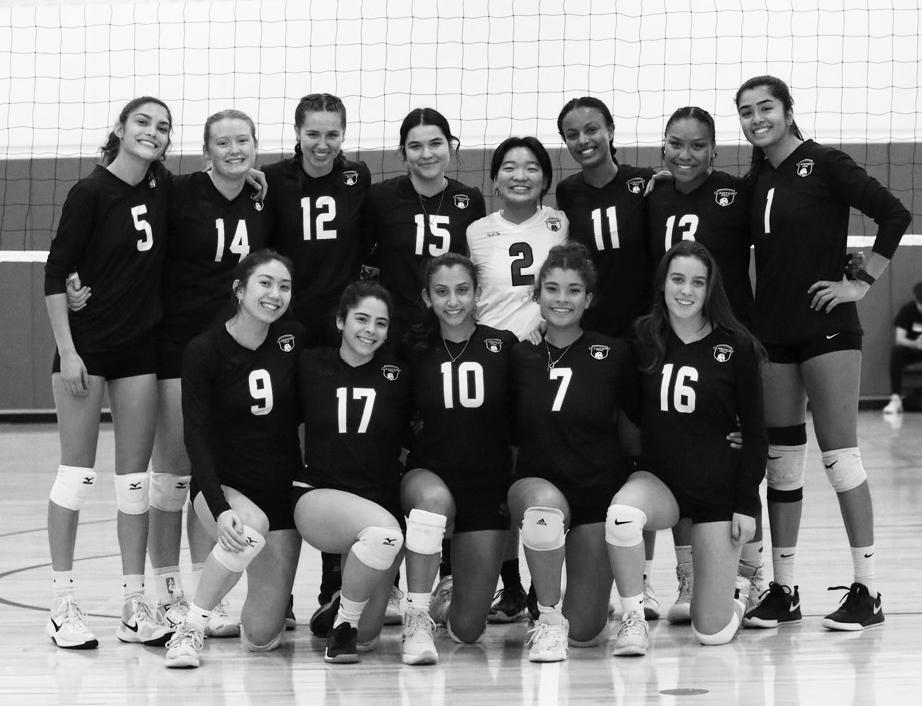
The Panther’s roster consists mostly of students who played varsity or at a similarly competitive level in high school. Nora Tahbaz SC ’23, president and co-captain of the club, originally wanted to play as an Athena at Claremont-MuddScripps (CMS), but decided that she wanted to focus more on her academics in college. Playing for the Panthers instead has allowed her to prioritize excelling in school while still competing at a high level.
“Obviously we want to win every game, but it’s much less hostile – it’s a super fun environment,” Tahbaz said. “[The team is] very academic focused, so [playing for CMS or Pomona-Pitzer] would have been a time commitment that not everyone was willing to do. This offers just another way for students to continue playing competitive volleyball and have something active in their week.”
Kaavya Narayan CM ’25, who started playing volleyball in seventh grade, also had aspirations to compete at the varsity level, but she decided that she wanted to explore some other passions in college.
“I wasn’t sure if I was ready to commit [time-wise] to a varsity team,” Narayan said. “So the club was the perfect balance for me of still being competitive and also having time to explore other interests.”
The club competes in the Southern California Collegiate
Volleyball League (SCCVL), and plays against schools from all three divisions including: Azusa Pacific, UC Riverside, Cal State Northridge, UC Irvine, UCLA, UCSB and more. In order to qualify for the league championships towards the end of the season, club teams must perform well in the regularseason tournaments scheduled by the league. Tahbaz said that the pre-set schedule makes planning competition easier for her and her co-captain, Nishka Ayyar CM ’23.
“[The SCCVL] plans our entire season, so we basically have a schedule already set for the spring,” Tahbaz said. “This season, we had three one-day tournaments that we played to try to qualify for leagues in San Diego — some of which we hosted.”
The Panthers practice three times a week to keep up with their competition schedule. Narayan said that the high level of the club makes for fun and engaging practice.
“We’ll typically start with some sort of warm up game, maybe like queen of the court,” Narayan said. “Then we’ll focus on a certain skill that day — if it’s passing, we’ll do half-court serving drills, where we’re working on setter-hitter connections. We usually always end practice with six on six playing, especially if we’re getting ready for a tournament.”
According to Tahbaz, because the club competes at such a high level and participates in many tournaments, they are able to receive lots of funding from different institutions on the campus like ASPC and the Student Investment Fund at Scripps.
“Between the league fee and the travel and food expenses, volleyball is one of the more expensive sports,” Tahbaz said. “Choosing not to go to nationals — which is hosted in Kansas City this year — would be much less expensive, but I think it is worth it because everyone has a really good time, and it is such a great opportunity to travel for sports. Plus, because we are a
club that competes at the national level, we have more flexibility when it comes to when we get to use the gym for practice, and we also are more likely to get more funding for next year.”
Ayyar says that her relationship with Tahbaz has allowed them to lead the team successfully and effectively. As a lot of the administrative aspects and the coaching falls upon them, Ayyar and Tahbaz divide the tasks to make for a balanced leadership.
“Nora and I have been friends since we joined the club together as [first-years],” Ayyar said. “So it’s easy for us to split the duties between us. We both take turns being the more vocal leader at practices but also in handling finances, setting up tournaments and making lineups for our games.”
While many of the students on the travel team are experienced players, the club itself is open to any student who is looking to play volleyball for fun. Tryouts are held at the beginning of every year, and the club hosts open-gym practices several times a semester. Ayyar said that she wishes more people knew about the club in general.
“We don’t do a ton of marketing, so I’m sure there’s a lot of people who don’t even know that we have a club team,” Ayyar said. “I think it would be cool if more people would come play with us during open gym, or even just come out and support us when we have home games.”
Narayan said that she is happy about the amount of new friends she has made through the club.
“I would say [the club] is the biggest way I’ve met other 5C students,” Narayan said. “My favorite part about the club would definitely be the team. It’s a great group of girls and it’s fun to play with them, but it’s also fun to just hang out with them and talk about their days and what they’re doing outside of volleyball.”
However, the administration expressed extreme concern for the lack of accountability of the account and requested access to its transaction history. The club complied, but were unable to provide the level of detail about past transactions that the administration wanted due to a lack of record keeping. The organization’s inability to explain each payment led the administration to suspect them of using the money to purchase alcohol.
“They divulged that ‘hey we’re looking for any transaction of illicit products, alcohol, etc.,’”
Myagkov said. “The accusation was that if we weren’t able to provide an itemized receipt for any transaction that was related to food or groceries, they said they would assume [that the money] had been spent on alcohol.”
Due to the club’s issues with working alongside Pomona, Myagkov admitted fault in how they handled the situation.
“All of this was a work in progress,” Myagkov said. “I won’t sit here and tell you that we were perfect … but I want to emphasize that we were always striving to do better than that.”
The investigation additionally extended beyond just the purchase of alcohol. According to Zoe Hancock SC ’23, Pomona administration levied charges of club members and leaders driving while intoxicated.
“We had a meeting with [Ash-Balá] where she accused us of drunk driving … which was a wild accusation because that has absolutely never happened,” Hancock said. “She had one student who had a bad experience at Reading Daze and that was all the information that we got, which also leaves us without any ability to make changes … because there’s nothing substantial there.”
In an email response to the club’s suspension, Ash-Balá explained that she would not go into detail on the situation to
Additionally, the organization can no longer lend gear, another way they try to make winter sports more accessible for students.
According to ski club and team member Lily Waldman SC ’26, the suspension is affecting underprivileged students the most.
“It’s very frustrating because it makes it difficult for people who don’t have that accessibility and who haven’t grown up in places with mountains to get up there,” Waldman said. “It’s really unfortunate.”
The email that the club sent on March 28 provided its recipients with a link to a petition in which they asked for signatures to affirm support of the club.
As of Thursday, March 30, the petition had 386 signatures, with supporters of the club signing that:
“This club has positively influenced my experience at the 5Cs. I am in full support of the club’s reinstatement.”
Additionally, the petition allowed students and alumni to leave testimonies of their experience with the club and the team.
Molly Lockwood PZ ’20 thanked the club for the opportunities it provided her during her time in Claremont, echoing other statements about the danger of suspending the club for students who, without it, cannot afford winter sports.
“Lift tickets run upwards of $250 these days. If it weren’t for 5C Ski Club, the barriers to access would have been insurmountable for me. Thanks to the tireless work of the club’s student leaders, I’ve been able to experience the joy of mountain sports and all the positive things that come along with it,” Lockwood wrote in her testimony.
Team member Will Sedo HM ’26 said he is hopeful for a solution so that the organization can continue to do what it does best –– to provide students in Claremont the opportunity to go to the mountains and have fun.
“We really hope that we can figure this out because at the end of the day we just want to go skiing and make it possible for other people to go skiing and boarding too,” Sedo said. “I hope we can figure this out soon.”
Sagehens softball milk victory in game one but suffer udder defeat in game two to split weekend series versus the Ephs
HAROLD FUSON
Pomona-Pitzer (P-P) softball welcomed Williams to the wild West Coast this past Friday for two pitchers’ duels in a pair of lowscoring matchups with the Hens.
The Sagehens hosted Williams College last Friday in the Ephs’ second stop of their SCIAC spring tour. P-P split the double header, winning the first game 2-0 but dropping the second 3-0 in 10 innings.
Pitcher Devin Waddell PO ’25 took the rubber in game one and showed dominance from start to finish. Waddell allowed only two hits across seven innings in a complete game shutout, striking out four Ephs along the way.
“My go to [pitch] is usually my curveball,” Waddell said. “I love to go in on righties and just try to challenge them and jam them. I think that’s what was giving me [the] most success on Friday.”
This performance brought Waddell’s season earned run average (ERA) down to a conference-best 1.27. It was her sixth complete game of the season and third shutout.
Waddell’s four strikeouts brought her season total to 43, far exceeding her freshman year total of 26.
Waddell explained her improvements in the pitching circle are a result of strides made in mentality.
“This [past] summer and fall, I really prioritized working [on] my mental game,” Waddell said. “I think this year I’ve been really able to trust myself more and fine tune some mental skills that I didn’t prioritize as much last year.”
The seven-inning shutout had no shortage of defensive highlights, and Waddell credited shortstop Bella Carreon’s PO ’25 stellar defense for her confidence as a pitcher.
“Knowing my defense can field basically anything and make those ESPN plays … gives me a lot of confidence out there to trust my stuff and get after it,” Waddell said.
In Carreon’s 2022 season, she posted a .995 fielding percentage in 32 games. This year, she’s continued that stellar play at shortstop, boasting a .950 percentage thus far.
On the other side of the ball, the Hens struck early in the bottom half of the first inning. A leadoff single from Kylie Liu PO ’26 followed by a double from Waddell set up runners on second and third base for Lauren Ziment PO ’24, who drove them both in with a single to center field.
“I was just looking to put something hard and in play,” said Ziment. “I fouled off quite a few pitches before [the base hit]. She was throwing a rise ball … [and] I was looking to make the adjustment and stay on top of
something and see if I could get [the] barrel on the ball … We’re all really aggressive on the base path, and we’ve found success in just putting the ball hard and playing challenging the opponent’s defense.”
Offensively, that would be all the Hens would need for the victory, as Waddell’s seven scoreless frames led them to the 2-0 win. Despite another lights out pitching performance, this time from Erika Rivera PZ ’24, the bats would fall quiet for P-P in game two. Rivera took a shutout into the 10th inning before ultimately giving in to the Williams offense.
The game began with a golden opportunity for the Sagehens, as three consecutive walks loaded the bases with no outs. However, three sequential strikeouts squandered what would turn out to be their best chance to score. Over the remainder of the game, the Hens managed to add only three more baserunners, including just one hit, a Waddell single in the third inning.
P-P saw the lack of offensive production, though frustrating, as a learning opportunity moving forward in their season.
“[Williams starting pitcher Sadie Leonard] came out chucking a fantastic rise ball against us in that second game,” Ziment said.
“It’s a good learning opportunity to see a pitcher that can throw it as hard as she can and can have such command over the ball. It’s only going to make us better.”

A scoreless tie brought the game into the 10th inning when an error during a sacrifice bunt, and two-run home run pulled Williams ahead 3-0. That would be all the Ephs needed as all three Hens who came to the plate in the bottom half of the inning would strike out.
The two-game set against Williams offered the Hens a quick break in SCIAC matchups ahead of a month of solely conference opponents. “Playing Williams is a great opportunity to have competition against an East Coast school,”
Waddell said. “There aren’t many Division III conferences out here on the West Coast, so getting to compete against a competitive roster … was really a great opportunity for us.”
Carreon believes that the Hens will continue to see success when they don’t waste any time in their games.
“The key thing for us right now is just getting after it early,” Carreon said. “If we get on them with our offense early enough, it’ll carry through the rest of the series.”
The series split brings P-P’s overall record to 11-9. The Sagehens will look to improve on their conference record of 2-1 in a three game set against Redlands consisting of an away game at 3 p.m. on Friday and a Saturday double-header at home.
March 31, 2023 PaGE 11 Sport S
SENA SELBY
The 2022-2023 women’s club volleyball team poses for a group picture at Pomona’s center for athletics, recreation & Wellness.
cOUrTESY: 5c WOMEN’S cLUB VOLLEYBaLL
Kylie Liu ‘26 leads off of first during the Sagehens’ series split versus Williams. college on March 24.
LIFE
WENDY ZhaNG • ThE STUDENT
P-P Athletic Director Miriam Merrill: breaking barriers in Athletics Administration
AMALIA KOCH
Next time you’re at a PomonaPitzer (P-P) sporting event, be on the lookout for a bright orange and blue suit. The person wearing that suit, passionately cheering the Sagehens onto victory, would be Miriam Merrill, director of athletics and chair of physical education for P-P.
“She’s always wearing that signature orange and blue combination to represent the Sagehens,” Bella Carreon PO ’25, a softball player for P-P, said. Merrill is one of two female athletic directors at the 5Cs, working alongside Erica Perkins Jasper, the athletic director for Claremont-Mudd-Scripps (CMS). Perkins Jasper and Merrill make up less than 24 percent of athletic directors in the NCAA who identify as female.
Merrill began serving in her current role with P-P in July of 2020. In the two and a half years since then, what she says she is proud of is P-P student-athletes’ success both on and off the field.
“There are many things to be proud of when I think of what we have accomplished during my first two and a half years,” Merrill said via email. “Our studentathletes are succeeding in their athletic spaces which is noted by the national and conference championships we have won. But this is only part of it, because our teams are excelling in the classroom. We have had several teams recognized as having the highest GPA in the NCAA, across all divisions. I continue to be amazed by them daily.”
Merrill’s passion for collegiatelevel athletics started as a track and field athlete at the University of Cincinnati, where she was the first All-America honoree in her school’s history, earning the title after finishing eighth in the NCAA Division I Indoor Championship meet in 2001. Her indoor weight throws continue to be some of the best performances her alma mater has seen. Her senior year, she was awarded the Helen Norman Smith Award, recognizing the top female senior student-athlete at the University of Cincinnati.
“My passion for sports started as a student-athlete [in college],” Merrill said. “I had a phenomenal experience and wanted to be in a position where I could do the same for the student athletes of the future.”
Merrill began her career in aThletics by coaching track and field and serving as director of athletics at several smaller institutions in Chicago before transitioning to liberal arts institutions. She served as associate athletic director at Hamilton College before she landed the job with Pomona College and Pitzer College athletics.
Q&A:
When asked what makes P-P Athletics unique and what kind of culture she aims to foster in the athletic department. Merrill said that there are several core values that are key to P-P’s mission.
“P-P Athletics is grounded in our core values which sets the stage for the culture we strive to create,” she said. “One department core value is holistic
Alisha Chulani on her time with the CMS women’s tennis team
AUDREY SAWYER
Last season, the Claremont-Mudd-Scripps (CMS) women’s tennis team won the NCAA Division III National Championship for the second time in program history. Alisha Chulani HM ’25 sat down with TSL to discuss her experience on the CMS women’s tennis team, winning the National Championship and her goals for the 2023 season.

TSL: Can you talk about your background and experience with tennis and how you got into the sport?
Alisha Chulani: I started playing [tennis] at about eight or nine years old. My parents wanted to put me in sports so I could have something to do and stay healthy, so I actually used to swim and play tennis … When I was about 13, my coach at the time told my parents that they should put me into tournaments because I was pretty competitive and it seemed like I enjoyed it. My parents did not grow up in the [United States] so they did not know anything about competitive tennis or [the junior circuit], so I sort of came in blind. [My parents] signed me up for a tournament and I had a lot of fun and it’s just gone from there.
TSL: Can you talk about how you are able to balance both your academic and athletic commitments as a student-athlete at Harvey Mudd College?
AC: It is tough to find a healthy balance, especially when a lot of my team goes to Claremont McKenna [College] and Scripps [College]. It is sometimes really hard to balance [academics and athletics], but I am super thankful for my friends at Harvey Mudd who are either athletes on different teams or even non-athletes because they are always super helpful and understanding with me — they always support me. My teammates are also super understanding, especially the other Mudder on the team … Surrounding myself with people who are super supportive really helps me find a balance.
TSL: Coming off of a national championship, what was your mindset coming into this season and what are you as an individual and as a team trying to focus on this year?
AC: It’s hard to return as national champions because you don’t want to make that your main focus for the new season. We needed to reset and start fresh because this season does not depend on last season whatsoever. We have a lot of new people both starting and coming in as [first-years] so it’s like a completely new team with a completely new mindset. I think that trying to keep that mindset fresh throughout this season will be super important because we know how hard we worked last year and we want
to continue that, but … we don’t want to continuously compare ourselves to last year.
TSL: What was going through your mind after losing to the University of Chicago early in this season after having beaten them in the national championship finals just last year?
AC: It’s definitely early on in the season and I think this program has a reputation of improving as the year goes on, so keeping that in mind is super important. Last year when we won the natty we were definitely not in prime cAondition during the early stages of the season. Knowing that we have so much potential to improve and that the real championship is in May is super important. Obviously, it would have been nice to win, but just because that didn’t happen doesn’t mean that we should be discouraged about the rest of the season.
TSL: What makes this team different from other teams you’ve competed on?
AC: I think we really just play for each other … Fighting for every ball and point is a core value amongst our team and I think it comes from the amount that we care about and compete for each other and our schools.
TSL: Would you say that the team’s success stems from the
this shared culture of excellence comes from the healthy crosscampus athletic partnership with CMS’s athletic director.
“I am grateful to have the opportunity to lead one of the best athletics departments within the best consortium and alongside one of the best female [athletic directors] in the business, Erica Perkins Jasper,” she said.
When asked about her and Perkins Jasper’s success in the typically male-dominated field of athletics, Merrill pointed out that DIII Athletics provides a great opportunity for women to occupy positions of authority — but there is still room for improvement.
“Division III offers the greatest opportunity for women in the athletics director (AD) position,” she said. “The percentage of women holding the AD position in DIII is 33 percent, which is higher than DI and DII; however, when you look at the racial breakdown, DIII’s numbers of women of color are lacking. The number of Black women ADs in DIII is only 3.6 percent, and I happen to represent one of the small 3.6 percent.”
Merrill said that she hopes her and Perkins Jasper’s presence in the athletic director roles at the 5cs can inspire future generations to continue diversifying athletics administration. She is already doing plenty to inspire women athletes at P-P.
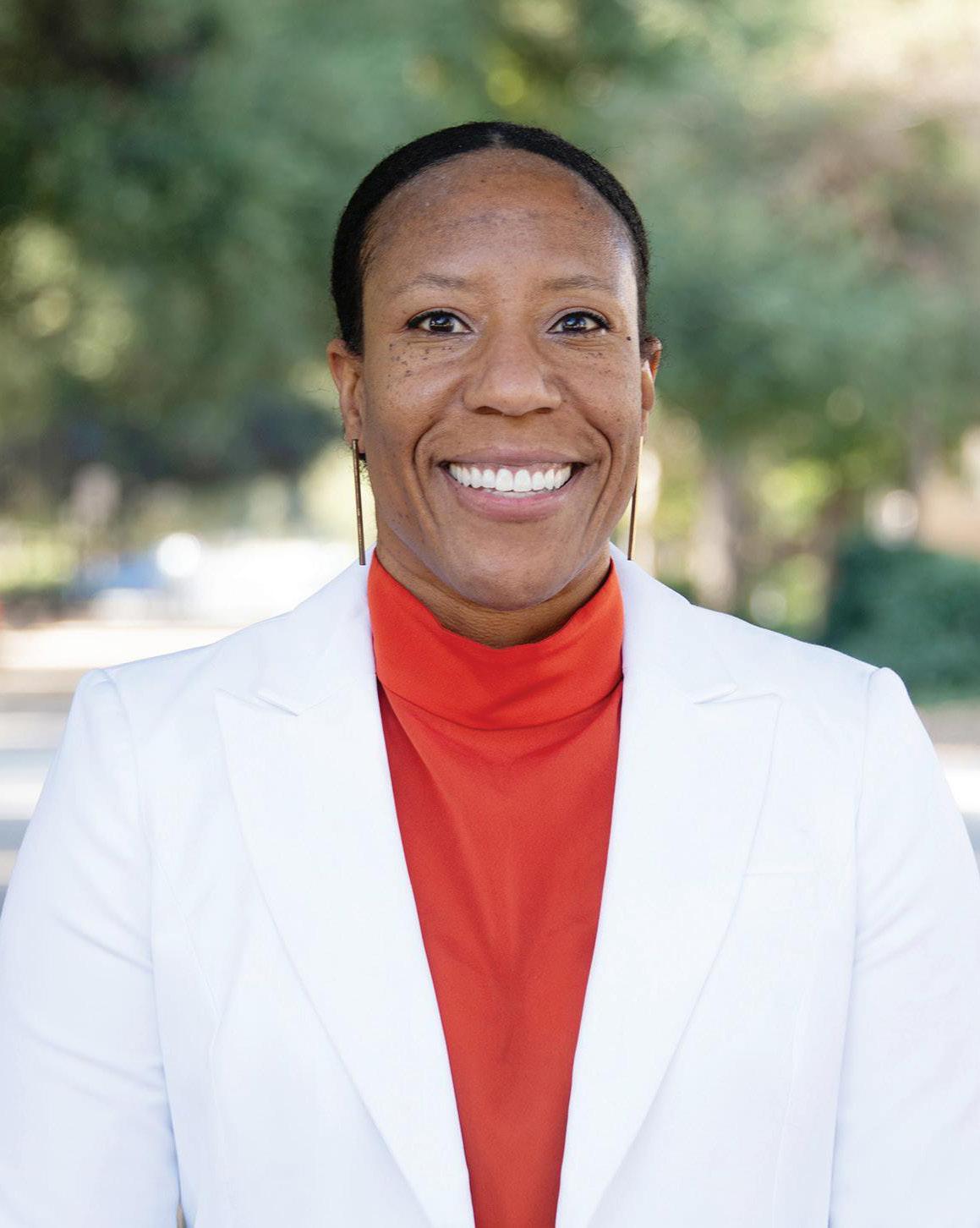
“She’s super supportive,” Carreon said. “She even comes to away games sometimes, always supporting all of the P-P teams.”
Olivia Reichle PO ’25, a sprinter for Sagehens track and field, said she was pleasantly surprised at Merrill’s presence at one of her meets.
“I didn’t see her coming, but all of a sudden she’s hanging the medal around my neck and I thought, ‘how cool! How many student-athletes can say that their AD was at their meet?’”
development where we facilitate the discovery of mental, physical and social skills. We uplift community by actively building and sustaining a culture of respect for all individuals and learn through shared challenges and triumphs. We strive for excellence by meeting high standards which help each other grow and succeed.”
According to Merrill, part of
Merrill said it’s just as important to celebrate her individual barrier-breaking success in athletics as it is to inspire future generations with her continuous interactions with P-P athletic teams.
“My hope for the future is that student athletes who look like me feel like they can see themselves in athletics administration,” Merrill said, “which is why we all need to continue to lift as we rise!”
culture the team has created and the fact that you play for each other or would you contribute it to something else?
AC: I think [team culture] is definitely a huge part of it, but I also think our coaches have instilled a lot of values of hard work and being smart about the way we play and the way we train. We are successful because we care about each other and we want to achieve something big and great with each other.
cOUrTESY: cMS aThLETIcS
TSL: What are you most looking forward to for the rest of the season?
AC: Honestly, I’m just looking forward to getting to compete with my friends. I think [getting to compete with each other] is the reason why we put in so much hard work. We really enjoy spending time with each other and we enjoy the sport. Beyond any big wins, I’m just really excited to spend time with my friends.
PaGE 12 March 31, 2023 Sport S
Miriam Merill is one of two female athletic directors at the 5cs, working alongside Erica Perkins Jasper. Merrill began serving in her current role with P-P in July of 2020.
cOUrTESY: MIrIaM MErILL
alisha chulani hM ’25 hits a forehand during a victory over MIT at the ITa indoor championships on March 4.
GRACE SAUERS, Production Editor EMMA CONSTABLE, Production Editor KYLIE MIES, A&C Designer PAUL YAN, Opinions Designer SELINA LU, Sports Designer JULIA VICTOR, Copy Chief DANIA ANABTAWI, Copy Chief CHASE WADE, Photo Editor WENDY ZHANG, Photo Editor BELLA PETTENGILL, Creative Director SASHA MATTHEWS, Graphics Editor SARA CAWLEY, News Editor MAXINE DAVEY, News Editor JAKE CHANG, News Associate INDIA CLAUDY, Arts & Culture Editor TANIA AZHANG, Arts & Culture Editor EMMA NEWMAN, Arts & Culture Associate ABBY LOISELLE, Opinions Editor ELENA TOWNSEND-LERDO Opinions Editor BEN LAUREN, Sports Editor ANSLEY WASHBURN, Sports Editor JENNA MCMURTRY, Special Projects Editor ANURADHA KRISHNAN, Special Projects Editor ANNIKA WHITE, DEI Editor MANAN MENDIRATTA, DEI Editor HALEY WEBB, Business Manager CLARE A’HEARN, Social Media Manager YAHJAIRI CASTILLON, Social Media Manager KANA JACKSON, Multimedia Editor SEOHYEON LEE, Web Developer SIENA SWIFT News Editorial Assistant MARIANA DURAN News Editorial Assistant THE STUDENT LIFE HANNAH WEAVER, Editor-in-Chief AVERI SULLIVAN, Managing Editor GERRIT PUNT, Managing Editor TSL’s Editorial Board consists of the editor-in-chief and two managing editors. Aside from the editorial, the views expressed in the opinions section do not necessarily reflect the views of The Student Life. Singles copies of TSL are free and may be obtained at news stands around campus. Multiple copies may be purchased for $0.47 per copy with prior approval by contacting editor@tsl.news. Newspaper theft is a crime; perpetrators may be subject to disciplinary action as well as civil and/or criminal prosecution. Editorial Board Senior Staff




 SIENA SWIFT
SIENA SWIFT









 JO KEYSER
JO KEYSER







 My queerness is constructed at the intersection of me and femme scrippsie ass.
My queerness is constructed at the intersection of me and femme scrippsie ass.




















